

Studies in Poverty, Inequality and Social Exclusion:
A Series by The Policy Press
Series Editor: David Gordon, Director of the Townsend Centre for International Poverty Research, University of Bristol
"Poverty, inequality and social exclusion remain the most fundamental problems that people face in the 21st century. This comprehensive series, published in association with the prestigious Townsend Centre for International Poverty Research at the University of Bristol, makes cutting-edge poverty-related research more widely available.
Publications, in a variety of formats including books and reports:
- develop practical policies and solutions for the alleviation and eventual ending of world poverty;
- ensure greater understanding of both the ‘scientific’ and ‘subjective’ measurement of poverty, inequality and social exclusion;
- provide investigations into the causes of poverty and exclusion;
- analyse the costs and consequences of poverty and exclusion for individuals, groups, families, communities and societies;
- include research into theoretical and conceptual issues of the definition and perceptions of poverty and exclusion;
- and enable wide dissemination of the policy implications of research into poverty and exclusion.
The Studies in Poverty, Inequality and Social Exclusion Series provides a high quality outlet for the publication of research from a variety of different disciplines on poverty in both the industrialised and ‘developing’ world. Different disciplines include: child health, economics, education, geographical science and demography, health and ageing, international development studies, law, mental health, social medicine, sociology, policy studies and politics.
Series Audience: students, researchers, academics and policy makers working in a range of disciplines, including the social sciences, historical studies and health. All those concerned with tackling health inequalities and social justice generally."
— The Policy Press

Publications from the Poverty, Inequality and Social Exclusion Series

Fighting poverty, inequality and injustice:
A manifesto inspired by Peter Townsend
Edited by Alan Walker, Adrian Sinfield and Carol Walker, June 2011 304 pages. Paperback (ISBN 9781847427144), Hardback (ISBN 9781847427144). Paperback £17.59, Hardback £52.00. Published by The Policy Press Series: Studies in Poverty, Inequality and Social Exclusion.
“Peter Townsend was the greatest British social scientist of the 20th Century. This book, by leading experts, clearly explains Townsend's contribution to knowledge and how his ideas will influence research and policy in the future.”
— David Gordon, Townsend Centre for International Poverty Research, University of Bristol
Synopsis: This important book makes a vital academic and political statement in the cause of social justice. It begins with an appreciation of the seminal contributions of Peter Townsend (1928-2009) and applies them to contemporary policy debates. It brings together many of the leading contributors to current debates in this field and provides a compelling manifesto for change for students and researchers in the social sciences, policy makers and practitioners, and everybody with an interest in creating a more equal and socially just society.
Contents: Peter Townsend's Legacy - Adrian Sinfield, Alan Walker and Carol Walker; The making of a pioneer researcher - Paul Thompson; Section A: Poverty and Inequality: The case for universal child benefit - Tony Atkinson; The understanding of poverty transformed - Jonathan Bradshaw; Social Justice for children: investigating and eradicating child poverty - Ruth Lister; Peter Townsend and the paradigm shift in the science of poverty - David Gordon; Means testing and universalism - Carol Walker; Underclass, Overclass, Ruling-class, Supernova-class - Danny Dorling; Section B: Health Inequalities: Addressing health inequalities: building on Peter Townsend's legacy - Margaret Whitehead; Public accountability and the modern university - Allyson Pollock and Sarah Boesveld; Section C: Ageing: Towards a new sociology of ageing: from structured dependency to critical gerontology - Chris Phillipson; Section D: Human Rights: Putting the lawyers in their place: the role of human rights in the struggle against poverty - Conor Gearty; Section E: Gender and Family Relationships: Townsend's insights into family relationships and their relevance to contemporary policy debates - Hilary Land and Hilary Rose; Section F: Disability: Disability: prospects for social inclusion - Carol Thomas; Radicalising social policy in the 21st century: a global approach - Bob Deacon and Nicola Yeates; Conclusion: building on the legacy - Adrian Sinfield, Alan Walker and Carol Walker.

Down and out:
Poverty and exclusion in Australia
By Peter Saunders, April 2011, 304 pages. Paperback (ISBN 9781847428387), Hardback (ISBN 9781847428394). Paperback £21.59, Hardback £56.00. Published by The Policy Press Series: Studies in Poverty, Inequality and Social Exclusion.
“This book represents a significant advance to poverty and exclusion research in Australia and internationally, it is essential reading for anyone interested in this rapidly changing field.”
— David Gordon, Townsend Centre for International Poverty Research, University of Bristol
“This book does an outstanding job of teasing out the relationships between low income, deprivation and social exclusion, analysed in an Australian context but with many lessons for anyone interested in identifying and addressing disadvantage.”
— Brian Nolan, University College Dublin
“This book moves us beyond the study of poverty using conventional income measures and introduces a range of other ways of studying poverty,deprivation and exclusion. The ideas and applications have lessons for all those involved in research on poverty and living standards.”
— Jonathan Bradshaw, Professor of Social Policy, University of York.
Synopsis: This landmark study provides the first comprehensive assessment of the nature and associations between the three main forms of social disadvantage in Australia: poverty, deprivation and social exclusion. Drawing on the author's extensive research expertise and his links with welfare practitioners, it explains the limitations of existing approaches and presents new findings that build on the insights of disadvantaged Australians and views about the essentials of life, providing the basis for a new deprivation-based poverty measure.
Peter Saunders is one of Australia's leading poverty researchers with an international reputation for his work in that and related fields. His work on poverty and inequality led to his election as a Fellow of the Academy of the Social Sciences and his appointment as a UNSW Scientia Professor. He has is currently President of the Australian Social Policy Association and of the Foundation for International Studies on Social Security.
Contents: Introduction and overview; Income poverty; Beyond low income: Economic resources, financial hardship and poverty; Experiencing poverty: The voices of poverty and disadvantage; Identifying the essentials of life; Measuring deprivation; A new poverty measure; Defining social exclusion and the social inclusion agenda; Identifying social exclusion; Implications for research and policy.

The Peter Townsend Reader

Edited by Alan Walker, David Gordon, Ruth Levitas, Peter Phillimore, Chris Phillipson, Margot E. Salomon, Nicola Yeates, Jan 2010, 696 pages. Paperback (ISBN 9781847424044), Hardback (ISBN 9781847424051). Paperback £19.99, Hardback £56.00. Published by The Policy Press.
“A valuable selection from the writings of an outstanding sociologist whose analyses have greatly enriched our understanding of social policy and its impact on people’s lives and the wider society.”
— Adrian Sinfield, Professor Emeritus of Social Policy, School of Social and Political Science, University of Edinburgh.
“This collection of Peter Townsend's writing is a tribute to his breadth of scholarship, and the superb clarity of his writing and his commitment will continue to inspire social scientists.”
— Professor Jonathan Bradshaw, Department of Social Policy and Social work, University of York
Synopsis: Peter Townsend, who sadly passed away in June 2009, had a long career researching an exceptional range of topics within the social sciences and campaigning against social inequalities. This reader brings together for the first time a collection of his most distinctive work, allowing readers to review changes and continuities over the past six decades and reflect on social issues that have returned to the fore today. A particular feature of the volume is in tracing the links between empirical evidence and both social theory and social policy and how those disciplines intersect. This reader will provide a teaching and learning resource for students in different disciplines of the social sciences and will also provide an insight into the development of one scientist's entire intellectual approach. We hope it will be a fitting memorial to his life and work.
Contents: Introduction; Section I: Sociology and social policy - edited by Alan Walker; Section II: From welfare state to international welfare - edited by Nicola Yeates; Section III: Poverty - edited by David Gordon; Section IV: Inequality and social exclusion - edited by Ruth Levitas; Section V: Health inequalities and health policy - edited by Peter Phillimore; Section VI: Older people - edited by Chris Phillipson; Section VII: Disability - edited by Alan Walker; Section VIII: Social justice and human rights - edited by Margot E. Salomon.


Exploring concepts of child well-being:
Implications for children's services
By Nick Axford, March 2008,272 pages, Hardback (ISBN 9781847420657), £52.00. Published by The Policy Press Series: Studies in Poverty, Inequality and Social Exclusion.
"Children's needs, rights, material resources, quality of life and inclusion do not identify the same target groups, and they call forth different 'service styles'. In a rigorous, scholarly yet readable way, the author casts light on the differences between these bases for official intervention in children's lives."
— Bill Jordan, Professor of Social Policy, University of Plymouth and University of Huddersfield
"This book moves effortlessly and clearly from ideas about well-being, through their measurement, to policy proposals. It is essential reading for those concerned with children's well-being, but I hope that its message will attract a wider audience."
— Ian Gough, Professor of Social Policy, University of Bath
Synopsis: This book provides an understanding of what child welfare is, explores how it can be measured and sets out the implications for children's services in incorporating child well-being into their work.
Full Description: Policy reforms to children's services in the UK and elsewhere encourage a greater focus on outcomes defined in terms of child well-being. Yet for this to happen, we need not only a better understanding of what child well-being is and how services can improve it, but also the ability to measure child well-being in order to evaluate success.
This book investigates the main approaches to conceptualising child well-being, applies them to the child population using household survey and agency audit data, then considers the implications for children's services. The author:
- provides a clear conceptual understanding of five perspectives on well-being: need, rights, poverty, quality of life and social exclusion
- demonstrates the value of each perspective
- charts levels of child well-being in an inner-London community, including violated rights and social exclusion
- sets out the features that children's services must have if they are to improve child well-being defined in these terms
This book should be read by everyone involved in developing, implementing and evaluating children's services, including researchers, policy makers and practitioners.
Nick Axford is a Researcher at Dartington Social Research Unit, UK. He has worked on numerous projects to measure child well-being in service and community contexts and then use the results to design new services.
Contents: Introduction; Part one: Defining and measuring the concepts: Need; Rights; Poverty; Quality of life; Social exclusion; Relationships between the concepts; Part two: The measures applied to children: Prevalence rates and distinguishing features; Relationships between the conditions; Part three: Implications for children's services: Matching conditions and service styles; Developing congruent children's services; Conclusions.

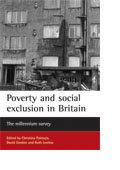
Poverty and social exclusion in Britain:
The millennium survey
Edited by Christina Pantazis, David Gordon and Ruth Levitas, University of Bristol, January, 2006, 512 pages, Paperback (ISBN 1861343736), £19.99. Published by
The Policy Press.
Full Description: This book is the most authoritative study of poverty and social exclusion in Britain at the start of the 21st century. It reports on the most comprehensive survey of poverty and social exclusion, ever to be undertaken in Britain: The Poverty and Social Exclusion Survey. This enormously rich data set records levels of poverty not just in terms of income and wealth but by including information about the goods and services which the British public say are necessary to avoid poverty.
The relationship between poverty and factors such as age, gender and paid work are explored, as well as other social issues such as crime and neighbourhood disadvantage. Poverty and social exclusion in Britain:
- charts the extent and nature of material and social deprivation and exclusion in Britain at the end of the 20th century;
- makes the first ever measurement of the extent of social exclusion based on a survey specifically designed for this purpose;
- provides a clear conceptual understanding of poverty and social exclusion from both an national and international perspective.
This important book should be read by officials and policy makers in national and local government, NGOs, charities and voluntary organisations dealing with poverty and social exclusion. It will also be required reading for academics and students of social policy, sociology, public health, economics and politics.
Studies in poverty, inequality and social exclusion series Series Editor: David Gordon, Director, Townsend Centre for International Poverty Research. Poverty, inequality and social exclusion remain the most fundamental problems that humanity faces in the 21st century. This exciting series, published in association with the Townsend Centre for International Poverty Research at the University of Bristol, aims to make cutting-edge poverty related research more widely available. Christina Pantazis is Head of the Centre for the Study of Poverty and Social Justice in the School for Policy Studies, David Gordon is Professor of Social Justice and Director of the Townsend Centre for International Poverty Research and Ruth Levitas is Professor of Sociology and (from 2006) Head of Department, all at the University of Bristol, UK.
Contents: Introduction Dave Gordon, Ruth Levitas and Christina Pantazis; Section One: Principles: The concept and measurement of poverty ~ Dave Gordon; The measurement of absolute and overall poverty ~ Peter Townsend and Christina Pantazis; The necessities of life Christina Pantazis, Dave Gordon and Peter Townsend; The concept and measurement of social exclusion ~ Ruth Levitas; Section Two: Processes: Does work pay? Employment, poverty and social exclusion from social relations ~ Nick Bailey; Debt and financial exclusion ~ Stephen McKay and Sharon Collard; Social exclusion and local services ~ Tania Fisher and Glen Bramley; Crime 'disorder' and insecurity and social exclusion ~ Christina Pantazis; Mental health, poverty and social exclusion ~ Sarah Payne; Section Three: People: Child, poverty and social exclusion ~ Eva Lloyd; Youth, poverty and social exclusion ~ Eldin Fahmy; Gender, poverty and social exclusion Christina Pantazis and Elisabetta Ruspini; Lone mothers, poverty and social exclusion ~ Ruth Levitas, Emma Head and Naomi Finch; Pensioners, poverty and social exclusion ~ Demi Patsios; Conclusion ~ Dave Gordon, Ruth Levitas, Christina Pantazis and Peter Townsend.

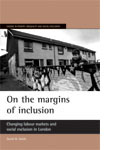
On the margins of inclusion:
Changing labour markets and social exclusion in London
By David M. Smith, September 2005, 256 pages, Paperback (ISBN 9781861346001), Hardback (ISBN 9781861346018). Paperback £17.59, Hardback £48.00. Published by The Policy Press Series: Studies in Poverty, Inequality and Social Exclusion.
WINNER OF THE SPA BEST NEW PUBLICATION AWARD 2007
"David Smith ably weaves a narrative on how changing labour markets and social policies affect the lives of economically marginalised individuals. ... I would highly recommend this book to anyone interested in issues surrounding marginality and exclusion in the post-industrial city."
— Urban Studies
Synopsis: On the margins of inclusion offers a fascinating account of how different groups of economically marginal people have adapted to and negotiate the offerings of a 'post industrial' labour market and a welfare system geared towards reintegrating them into formal employment. Through close ethnographic study of people living on a South London housing estate the book highlights collective strategies and responses to labour market and welfare changes and considers how these responses can, in themselves, contribute to patterns of community-based exclusion.
Full Description: On the margins of inclusion explores the notion of 'social exclusion' from the perspective of those deemed to be 'socially excluded' and provides a compelling and vivid portrait of lives at the insecure, low-paid end of the labour market. The ethnography is used to illuminate key issues in sociology and social policy and to tackle debates and controversies that are central to current discussions on the appropriate role and function of state welfare. A thorough discussion of current policies to address social exclusion and area regeneration is woven into the fieldwork analysis. On the margins of inclusion is essential reading for researchers, academics and higher-level students in sociology and social policy, and will also be of interest to policy makers in the field. Studies in poverty, inequality and social exclusion series Series Editor: David Gordon, Director, Townsend Centre for International Poverty Research. Poverty, inequality and social exclusion remain the most fundamental problems that humanity faces in the 21st century. This exciting series, published in association with the Townsend Centre for International Poverty Research at the University of Bristol, aims to make cutting-edge poverty related research more widely available. For other titles in this series, please follow the series link from the main catalogue page.
Contents: Introduction; Globalisation and social exclusion; Poverty and social exclusion: theory and policy; Life and labour on the St. Helier estate 1930-2000; Labour market opportunities and welfare-to-work; Lone parents, work and welfare; Informal opportunities and social divisions; Labour markets, exclusion and social capital; On the margins of inclusion.

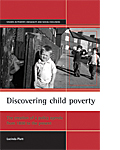
Discovering child poverty:
The creation of a policy agenda from 1800 to the present
By Lucinda Platt, January 2005, 156 pages, Paperback (ISBN 9781861345837), £11.99. Published by The Policy Press Series: Studies in Poverty, Inequality and Social Exclusion.
"Accessible and scholarly, pioneering and timely, this book will be invaluable to students, researchers and professionals seeking to understand the political significance of child poverty, its evolution as a concept and policy, and its importance in contemporary debate on the restructuring of the welfare state."
— Harry Hendrick, Institute of History, University of Southern Denmark
"Platt's analysis of the interplay of various perceptions of poverty and the proposed or actual policy responses is both detailed and nuanced, and much can be learned from it."
— Journal of Social Policy
Synopsis: This book charts key British developments in child welfare, child poverty research and state support for children from 1800 to the present day. With direct quotations from key sources, it argues that even in the face of clear evidence of hardship the response of policy makers to child poverty has been ambivalent.
Full Description: Child poverty is currently regarded by many as the 'number one' issue in Britain. Yet it has not always been so high on the policy agenda. What were attitudes to poor children 200 years ago? How did child poverty emerge as both a quantifiable and urgent issue? And how did policy makers respond? These are the questions that this book tackles. The book: · presents a broad but sophisticated overview of 200 years of investigation into and responses to the plight of poor children; · identifies key moments and figures of the period; · includes chapters on children and work, education and child poverty research to provide the essential context for the story of the 'discovery' of child poverty. Clearly and accessibly written, this book provides a concise but richly detailed account of the subject. It will appeal to policy makers, practitioners, researchers and all those with an interest in child poverty wishing to understand the antecedents of current research and policy. Studies in poverty, inequality and social exclusion series Series Editor: David Gordon, Director, Townsend Centre for International Poverty Research. Poverty, inequality and social exclusion remain the most fundamental problems that humanity faces in the 21st century. This exciting series, published in association with the Townsend Centre for International Poverty Research at the University of Bristol, aims to make cutting-edge poverty related research more widely available. For other titles in this series, please follow the series link from the main catalogue page.
Contents: Introduction: scope and argument of the book; The conditions for child poverty: context and chronology; A fit occupation for children? Children and work; Workers of the future: the education of children; Discovering child poverty: child poverty and the family to 1945; Rediscovering child poverty: poverty and policy from 1945; Conclusion: child poverty on the agenda.

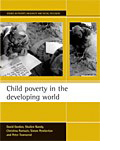
Child poverty in the developing world
By David Gordon, Shailen Nandy, Christina Pantazis, Simon Pemberton, School for Policy Studies, University of Bristol and Peter Townsend, Centre for the Study of Human Rights, London School of Economics and Political Science, October 2003, 44 pages, Paperback (ISBN 1 86134 559 3) £9.99 (US$15.00). Published by The Policy Press.
Synopsis: This report provides a summary of the results from a major international research project, funded by UNICEF, on child rights and child poverty in the developing world.
Full Description: The report presents the first ever scientific measurement of the extent and depth of child poverty in developing regions. This measurement is based upon internationally agreed definitions arising from the international framework of child rights. Indicators of severe deprivation of basic human need for shelter, sanitation, safe water, information, health, education and food were constructed using survey data on nearly 1.2 million children in 46 countries collected mainly during the late 1990's. This is the largest, most accurate survey sample of children ever assembled.
The results show that over one billion children - more than half the children in developing countries - suffer from severe deprivation of basic human need and over a third (674 million) suffer from absolute poverty (two or more severe deprivations).
The study findings indicate that considerably more emphasis needs to be placed on improving basic infrastructure and social services for families with children, particularly with regards to shelter, sanitation and safe drinking water in rural areas. Anti-poverty strategies need to respond to local conditions; blanket solutions to eradicating child poverty will be unsuccessful.
Contents: Introduction: Child poverty and child rights in developing countries; Measurement of child poverty and standard of living; Severe deprivation among children in the developing world; Conclusions and policy implications. Bibliography; Appendix: Severe deprivation and absolute poverty of children: country data.

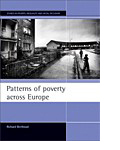
Patterns of poverty across Europe
Richard Berthoud, Institute for Social and Economic Research (ISER), University of Essex, March 2004, 60pg Paperback (ISBN 1 86134 574 7) £12.99 (US$20.95). Published by The Policy Press.
Full Description: It is widely accepted that income poverty should be defined in relative terms - but relative to where? Almost all household poverty statistics count the number of poor in relation to the national average of the country they are living in. Would the picture be different if we compared families' incomes with the local regional average? Or why not compare incomes across the whole of Europe?
Using new EU-wide data, this report shows very different patterns of poverty across Europe, depending on the enchmark used. From a European perspective, the poor are heavily concentrated in Portugal, south-western Spain, southern Italy and Greece. The research also tests two methods of calibrating poverty lines to show which level of area offers the most sensitive indicator of social exclusion. The results fail to corroborate the conventional view that nationally based poverty lines are the most appropriate basis for international comparisons.
The findings have important implications for the spatial distribution of poverty within and between countries (including the UK) and for the development of anti-poverty policy across the EU.
This report provides a new international perspective to policy makers both within each country and at EU level. It offers new comparative insights to economists interested in the distribution of income, and to sociologists studying relative deprivation.
Contents: Geography, inequality and poverty: an EU perspective; Data from the European Community Household Panel survey; Income variations between (and within) countries; National relative poverty; Income variations between (and within) regions; Regional relative poverty; Calibrating poverty lines according to social norms; Calibrating poverty lines in terms of the risk of financial hardship; Where are Europe's poor?

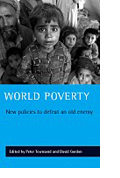
World poverty:
New policies to defeat an old enemy
Edited by Peter Townsend and David Gordon, September 2002, 480pp, Paperback (ISBN 1 86134 142 3) £16.99/US$31.00. Published by The Policy Press.
→ Download manifesto [PDF, 0.04MB]
"This publication will make a valuable contribution to the integration of human rights values into world poverty reduction strategies."
— Mary Robinson, United Nations High Commissioner for Human Rights
Full Description: World poverty is a major new book offering fresh insights into how to tackle poverty worldwide. With contributions from leading scholars in the field both internationally and in the UK, the book asks whether existing international and national policies are likely to succeed in reducing poverty across the world. It concludes that they are not and that a radically different international strategy is needed. A Manifesto for international action against poverty is presented.
The interests of the industrialised and developing world are given equal attention and are analysed together. Policies intended to operate at different levels - international, regional, national and sub-national - ranging from the policies of international agencies like the UN and the World Bank through to national governments, groups of governments and local and city authorities - are examined. Key aspects of social policy, like 'targeting' and means-testing, de-regulation and privatisation, are considered in detail. An outstanding work of scholarship, World poverty will become a definitive point of reference for anyone working, studying or researching in the poverty field.

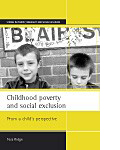
Childhood poverty and social exclusion:
From a child's perspective
By Tess Ridge, University of Bath.
“This book provides richness and context to debates about childhood poverty, and remedies for it, from the perspectives of children themselves”
— Sue Middleton, Centre for Research in Social Policy, Loughborough University
Synopsis: Without a deeper understanding of poverty as a lived experience in childhood, policies targeted at eradicating child poverty may fail. Using child-centred research methods to explore children’s own accounts of their lives, this moving and sobering book presents a rare and valuable opportunity to understand the issues and concerns that low-income children themselves identify as important. The findings raise critical issues for both policy and practice.
Contents: The challenge of child poverty: developing a child-centred approach; What do we know about childhood poverty?; Children’s access to economic and material resources; ‘Fitting in’ and ‘joining in’: social relations and social integration; Family life and self-reflection; Experiences and perceptions of school: analysis of BHPYS data; Childhood poverty and social exclusion: incorporating children’s perspectives.

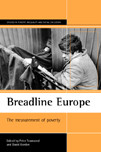
Breadline Europe:
The measurement of poverty
Edited by David Gordon and Peter Townsend, March 2001, 480 pp, Paperback (ISBN 1 86134 292 6) £17.99/US$32.50, Hardback (ISBN 1 86134 293 4) 50.00/US$90.00. Published by The Policy Press.
"This is the first intellectually solid charge sheet drawn up against the post-Reagan free market economy in the European Union and, above all, in the post-Communist 'transition' states"
— The Observer
"Breadline Europe will serve as a major reference book for poverty research as well as for the public discourse on poverty policies for years to come"
— Jurgen Kohl, Institute of Sociology, University of Heidelberg
Synopsis: Breadline Europe is the first book to examine poverty in Europe within the international framework agreed at the 1995 World Summit on Social Development. Its aim is to provide a scientific and international basis for the analysis and reduction of poverty. With contributions from leading European poverty researchers, it demonstrates that there is far more important research into the problem of poverty going on in many countries of Europe than the international agencies and national governments admit or even realise. Main themes are:
- The need for a scientific poverty line
- The need for better theories distinguishing between poverty and social exclusion
- The need for better international social policy and for better policy-related analyses of poverty
Breadline Europe provides up-to-date, essential reading for social science undergraduates and postgraduate students. It will also be of considerable interest to policy makers and NGOs with a concern for poverty reduction.
Contents: Introduction: the measurement of poverty in Europe Peter Townsend and David Gordon; Part I: Resolving poverty: the need for a scientific consensus on concept and measurement; The international build up: poverty and the spirit of the time Jacques Baudot; Reducing poverty: the implications of the 1995 Copenhagen Agreement for research on poverty John Langmore; Measuring absolute and overall poverty David Gordon; Absolute and overall poverty: a European history and proposal for measurement David Gordon, Christina Pantazis and Peter Townsend; Women and poverty: a new research methodology Elisabetta Ruspini; Horses for discourses: poverty, purpose and closure in minimum income standards policy John Veit-Wilson; Poverty, inequality and health Björn Halleröd; Part II: European analysis of poverty and social exclusion; Poverty in Finland and Europe Markku Lindqvist; Poverty and affluence in Ireland: a comparison of income and deprivation approaches to the measurement of poverty Richard Layte, Brian Nolan and Christopher Whelan; Child poverty in comparative perspective Jonathan Bradshaw; Poverty and the poor in Central and Eastern Europe Ludmila Dziewiecka-Bokun; Poverty in Hungary and in Central and Eastern Europe Zsuzsa Ferge; Measurement and definitions of poverty in Russia Simon Clarke; What is social exclusion? Ruth Levitas; Social exclusion: concepts and evidence Tania Burchardt; Trajectories of social exclusion: the wider context for third and first worlds Graham Room; Conclusion Peter Townsend and David Gordon.

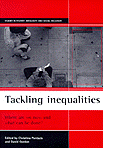
Tackling inequalities:
Where are we now and what can be done?
David Gordon and Christina Pantazis, January 2000, 256pp, Paperback (ISBN 1 86134 146 6) £15.99/US$28.75. Published by The Policy Press.
"An excellent contribution to the ongoing policy debate surrounding social exclusion and how best to tackle it."
— British Sociological Association Network Magazine
"...a very clearly written and accessible book, which at the same time manages to present a range of key issues and pack in lots of factual information."
— Politics Included
"The original ideas in this book cut through the usual quick-sand performance indicators. They challenge the conventional assumption of progress towards equality. But they do so with a practical edge that will appeal to those monitoring and implementing social policies."
— Ludi Simpson, Cathie Marsh Centre, University of Manchester
"... an essential book for those concerned with policy analysis in relation to social justice and equality."
— Jay Ginn, University of Surrey
Synopsis: Featuring a special chapter by Professor Peter Townsend and bringing together leading experts in their fields, this wide-ranging new book provides a systematic critique of the current government's policies to tackle inequalities. It is the first up-to-date account of the level of inequalities inherited by the Labour Government, and looks at the policy options with which it is faced. The book examines current largely area-based policies to tackle inequalities in crime, health, education, housing and social exclusion. It provides a valuable contribution to the emerging policy debate on how to tackle inequalities and will be essential reading for academics, policy-makers and students with an interest in inequality, poverty and social exclusion.
Contents: Introduction; Inequalities in income and standard of living Dave Gordon; Ending world poverty in the 21st Century Peter Townsend; Poverty and health inequalities George Davey-Smith; Is it worth reducing inequalities in health? Danny Dorling; Poverty and inequalities in crime Christina Pantazis; How can we end inequalities in housing? Alan Murie; Inequalities in education: Targets and Education Action Zones Ian Plewis; Do governments ever listen to research? Walter Barker; Conclusion.

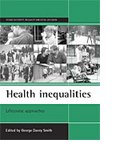
Health inequalities:
Lifecourse approaches
George Davey Smith, September 2001, 288 pp. Paperback (ISBN 1 86134 322 1) £15.99/US$28.75. Hardback (ISBN 1 86134 323 X) £50.00/US$90.00. Published by The Policy Press
"Professor Davey Smith's research on the lifecourse and health is truly innovative and unique. Many academics from diverse disciplines will want this as part of their permanent libraries."
— John Lynch, School of Public Health, University of Michigan
"This book will become a classic for those interested in health inequalities."
— Jennifer Roberts, London School of Hygiene and Tropical Medicine
Synopsis: The lifecourse perspective on adult health and on health inequalities in particular, is one of the most important recent developments in epidemiology and public health. This book brings together, in a single volume, the work of one of the most distinguished academics in the field. It is the first to specifically take a lifecourse approach to health inequalities. The book presents a large volume of innovative, empirical research which demonstrates the importance of social disadvantage, throughout the lifecourse, with respect to inequalities in life expectancy, death rates and health status in adulthood; contains an extensive overview of lifecourse epidemiology as applied to socio-economic differentials in health. This publication is essential reading for academics, students and policy makers with an interest in public health, epidemiology, health promotion and social policy.
Contents: Introduction; History; Patterns of health inequality; Health and lifetime social circumstances; Explaining health inequalities: conventional adult-life approaches; Social inequality and population health; Reducing health inequalities, now and in the future.

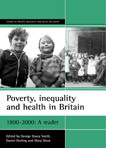
Poverty, inequality and health in Britain:
1800-2000: A reader
Edited by George Davey Smith, Daniel Dorling and Mary Shaw, June 2001, 384pp. Paperback (ISBN 1 86134 211 X) £15.99/US$28.75. Hardback (ISBN 1 86134 328 0) £50.00/US$90.00. Published by The Policy Press.
"This book is an invaluable reference for academics and students, working in a variety of disciplines, who are interested in health inequalities."
— Ian Rees Jones, St George's Hospital Medical School
Synopsis: Inequalities in health, in terms of both empirical evidence and policies to tackle their reduction, are currently high on the research and political agendas. This reader provides two centuries of historical context to the current debate. Poverty, inequality and health in Britain: 1800-2000 presents extracts from classic texts on the subject of poverty, inequality and health in Britain. For the first time, these key resources are presented in a single volume. Each extract is accompanied by information about the author, and an introduction by the editors draws together themes of change and continuity over two hundred years. Some extracts present empirical evidence of the relationship of poverty and health, while others describe the gritty reality of the everyday struggles of the poor. This book will be of interest to students, researchers, academics and policy makers working in a range of disciplines: the social sciences, historical studies and health. It will also be of interest to all those concerned with tackling health inequalities and social justice generally.
Contents: Introduction; Extracts from: Clarkson's An essay on the impolicy of the African slave trade (1788) and An essay on the slavery and commerce of the human species, particularly the African (1817, 1785); Malthus' An essay on the principle of population (1798, 1985); Factory Inquiry Commission Report (1833); Farr's Vital statistics: A memorial volume (1837, 1885, 1975); Chadwick's Report on the sanitary conditions of the labouring population of Gt Britain (1842, 1965); Engels' The condition of the working class in England (1845, 1987); Mayhew's London labour and the London poor (1851-52); Marx's Inaugural address of the International Working Men's Association (1864, 1992); Rowntree's Poverty: a study of town life (1901, 1971); Booth's On the city: physical pattern and social structure (1902-03, 1967); Pember Reeves' Round about a pound a week (1913, 1988); Tressell's The ragged trousered philanthropists (1914, 1955); Collis and Greenwood's The health of the industrial worker (1921); White's Natural and social selection: a 'Blue-Book' analysis (1928); M'Gonigle and Kirby's Poverty and public health (1936); Orr's Food, health and income (1936, 1937);Hannington's The problem of distressed areas (1937); Spring Rice's Working-class wives: Their health and conditions (1939); Beveridge's Social Insurance and Allied Services (1942); Titmuss' Birth, poverty and wealth (1943); Morris' Health (1944); Hewetson's Ill-health, poverty and the state (1946); Bevan's In place of fear (1947); Abel-Smith and Townsend's The poor and the poorest (1965); Roberts' The classic slum: Salford life in the first quarter of the century (1971); Tudor Hart's 'The inverse care law' (1971); Inequalities in health: Report of a Research Working Group chaired by Sir Douglas Black (The Black Report) (1980); Independent Inquiry into Inequalities in Health (The Acheson Report) (1998).

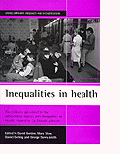
Inequalities in health:
The evidence presented to the Independent
Inquiry into Inequalities in Health
Edited by David Gordon, Mary Shaw, Daniel Dorling and George Davey Smith, introduction by Peter Townsend, October 1999, 288pp. Paperback (ISBN 1 86134 174 1) £18.99/$34.50. Published by The Policy Press.
"... a useful collection of state of the art papers."
— British Medical Journal
Synopsis: The Acheson Inquiry was the most important government-backed examination into inequalities in health in the past 20 years. However, much of the detailed evidence presented to the Inquiry has not been published - until now. This book presents all seventeen chapters of evidence commissioned by the Acheson Inquiry to inform their work. It complements both the Acheson Inquiry report published by The Stationery Office and The widening gap which provides a broad overview and systematic interpretation of the Inequalities in Health debate.
Contents: Introduction; A structural plan needed to reduce inequalities of health Peter Townsend; Preface by Sir Donald Acheson; Mother, fetus, infant, child and family: socio-economic inequalities Catherine Law; Youth Patrick West; Adults of working age (16/18 to 65 years) David Blane; Inequalities in health: older people Kay-Tee Khaw; Health inequalities: the place of housing Richard Best; The social environment Richard Wilkinson; Poverty across the life-course and health George Davey Smith; The role of the NHS in tackling inequalities in health Michaela Benzeval and Anna Donald; Tackling inequalities in health and healthcare - the role of the NHS Bobbie Jacobson; Nutrition and health inequalities Michael Nelson; Education and health inequalities Geoff Whitty, Peter Aggletin, Eva Garmarnikow and Paul Tayrer; Geographical inequalities in mortality, morbidity and health-releated behaviour in England Sally Macintyre; Ethnic inequalities in health James Nazroo; Inequalities in health: road transport and pollution Adrian Davis; Inequalities in health related to transport Barbara MacGibbon; Gender Sara Arber; Mental health David Goldberg; Smoking, drinking, physical activity and screening uptake and health inequalities Jane Wardle, Michael Farrell, Melvyn Hillsdon, Martin Jarvis, Stephen Sutton and Margaret Thorogood; Inequalities in oral health Aubrey Sheiham and Richard G. Watt.

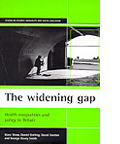
The Widening Gap:
Health inequalities and policy in Britain
Mary Shaw, Daniel Dorling, David Gordon and George Davey Smith, December 1999, 292 pp. Paperback (ISBN 1 86134 142 3) £16.99/US$31.00. Published by The Policy Press.
→ Download manifesto [PDF, 0.05MB]
"When Tony Blair tours the North to show the wide variations within regions as well as between them, and when Alan Milburn declares commitment to tackling inequalites in heart disease as part of making a fairer society generally, then you know something has touched a chord. It is rare for an academic work to have such an effect on media and ministers, but The widening gap has done just this."
— John Nicholson, Chief Executive, UK Public Health Association
"a brilliant book. ... provides a marvellous template for similar efforts to investigate the worst and best-health million in other countries around the world."
— International Journal of Epidemiology
" ...a challenge and a lesson for all who are working to reduce inequalities in health ...the analysis of the potential impact of current government policies on inequalities in health is enlightening."
— British Medical Journal
"... there is much in this book to be commended...it will be widely read and quoted."
— The Lancet
Synopsis: Relentlessly, the wide health gap between different groups of people living in Britain continues to get even wider. This book presents new evidence (which was not available to the government's Independent Inquiry into Inequalities in Health) on the size of the gap, and the extent to which the gap is widening. In particular, new geographical data are presented and displayed in striking graphical form. This book challenges whether the government is concerned enough about reducing inequalities and highlights the living conditions of the million people living in the least healthy areas in Britain. It presents explanations for the widening health gap, and addresses the implications of this major social problem. In the light of this evidence the authors put forward social policies which will reduce the health gap in the future.

A Selection of Other Publications
Injustice:
Why social inequality persists

By Daniel Dorling, April 2011, 368 pages, Paperback (ISBN 9781847427205), Hardback (ISBN 9781847424266). Paperback £7.99, Hardback £14.99. Published by The Policy Press
“A brilliant analysis of the nature of inequality in the UK. It is a 'must read' for anyone who wants to understand inequality and how we might tackle it."
— Matthew Taylor, Chief Executive, RSA.
“For decades researchers have shown the damage inequality does to all Society and Dorling's wonderful book extends this. With brilliance and passion, Dorling analyses the mind-set of entitlement among those who hold ever tighter to money, power and life's best rewards, generation to generation.”
— Polly Toynbee, The Guardian.
Synopsis: Few would dispute that we live in an unequal and unjust world but what causes this inequality to persist? Leading social commentator and academic Danny Dorling claims, in this timely book, that, as the five social evils identified by Beveridge are gradually being eradicated, they are being replaced by five new tenets of injustice, viz: elitism is efficient; exclusion is necessary; prejudice is natural; greed is good and despair is inevitable. In an informal yet authoritative style, Dorling examines who is most harmed by these injustices and why, and what happens to those who most benefit. Hard-hitting and uncompromising in its call to action, this is essential reading for everyone concerned with social justice.
Danny Dorling is Professor of Human Geography at the University of Sheffield. With colleagues, he has published 25 books, including eight atlases, one now translated into seven languages. In 2007, (Sir) Simon Jenkins described him as 'Geographer Royal by Appointment to the Left'. In 2008, Dorling was appointed Honorary President of the Society of Cartographers and, in 2009, he was presented with the Back Award of the Royal Geographical Society.
Contents: Foreword - Richard Wilkinson and Kate Pickett; Introduction: Inequality: the antecedent and outcome and of injustice; 'Elitism is efficient': new educational divisions; 'Exclusion is necessary': excluding people from society; 'Prejudice is natural': a wider racism; 'Greed is good': consumption and waste; 'Despair is inevitable': health and well-being; Conclusion, conspiracy, consensus; Afterword.


Disability and poverty:
A global challenge
Edited by Arne H. Eide and Benedicte Ingstad, March 2011, 256 pages. Paperback (ISBN ), Hardback (ISBN 9781847428851). Paperback £, Hardback £56.00. Published by The Policy Press.
Synopsis: This book is about being disabled and being poor and the social, cultural and political processes that link these two aspects of living. Environmental barriers, limited access to services and discriminatory attitudes and practice are among key elements that drive disabled people into poverty and keep them there. 'Disability and poverty' explores the lived realities of people with disabilities from across the developing world and examines how the coping strategies of individuals and families emerge in different contexts.
Arne H. Eide is Chief Scientist at SINTEF, Professor at Sør-Trøndelag University College, Norway, and Guest Professor at Stellenbosch University, South Africa. He has extensive research experience in the fields of disability and rehabilitation. Benedicte Ingstad is Professor of Medical Anthropology at the University of Oslo. She has carried out research on disability in developing countries for 30 years and has published extensively on the topic of 'Disability and culture'.
Contents: Introduction: Disability and Poverty: A Global Challenge - Benedicte Ingstad and Arne Eide; The Social Inclusion of Persons with Disabilities in Poverty Reduction Policies and Instruments: Initial Impressions from Malawi and Uganda - Margaret Wazakili, Tsitsi Chataika, Gubela Mji, A.K. Dube, Malcolm MacLachlan; Disability, poverty and health care: Changes in the canji ("disability") policies in the history of the People's Republic of China - Gry Sagli and Heidi Fjeld; Living conditions for people with disabilities in developing countries - Arne Eide and Mitch Loeb; 'No disabled can go here…' Disability and poverty in Malawi: Aspects of education - Stine Braaten and Mitch Loeb; Disability and poverty in Uganda - Herbert Muyinda and Susan R. Whyte; "We are also disabled". Disability grants and poverty politics in rural South Africa - Camilla Hansen and Washeila Sait; Where culture really matters: Disability and well-being in Yemen - Benedicte Ingstad, Arwa Baider, Lisbet Grut; Disability and barriers in Kenya - Lisbet Grut, Joyce Olenja, Benedicte Ingstad; Disability and social suffering in Zimbabwe - Jenny Mudzeresi and Benedicte Ingstad; "My story started from food shortage and hunger": Living with landmines in Cambodia - Merete Taksdal; Poverty as trauma: Methodological problems when reality gets ugly - Hans Husum and Odd Edvardsen; Some concluding thoughts - the way ahead -Arne Eide and Benedicte Ingstad.


Child poverty, evidence and policy:
Mainstreaming children in international development
By Nicola A. Jones and Andy Sumner, Jan 2011, 224 pages, Paperback (ISBN 9781847424457), Hardback (ISBN 9781847424464). Paperback £19.19, Hardback £52.00. Published by The Policy Press.
“This book is a significant and timely contribution to an improved understanding of the neglected but all-too-important subject of Child Poverty and what to do about it. It is a 'must read' for researchers and policy makers interested in child poverty and evidence-based advocacy and public policy.”
— Dr. Assefa Bequele, Director, African Child Policy Forum
“Jones and Sumner provide a sophisticated analysis of the multi-dimensional interplay between evidence and policy on child poverty. The result is a compelling account of why child poverty in developing countries needs to be tackled by increasing children's visibility, voice and vision in both knowledge generation and policy processes. Academics and policy audiences alike will find it invaluable.”
— Sandra Nutley, Professor of Public Management, University of Edinburgh Business School.
Synopsis: This book is about the opportunities and challenges involved in mainstreaming knowledge about children in international development policy and practice. It focuses on the ideas, networks and institutions that shape the development of evidence about child poverty and wellbeing, and the use of such evidence in development policy debates. It also pays particular attention to the importance of power relations in influencing the extent to which children's voices are heard and acted upon by international development actors. The book weaves together theory, mixed method approaches and case studies spanning a number of policy sectors and diverse developing country contexts in Africa, Asia and Latin America. It therefore provides a useful introduction for students and development professionals who are new to debates on children, knowledge and development, whilst at the same time offering scholars in the field new methodological and empirical insights.
Nicola Jones is a Research Fellow in the Social Development Programme at the Overseas Development Institute where she works on issues related to knowledge and power in the social policy sector, with a particular focus on gender and childhood. Andy Sumner is a Fellow of the Vulnerability and Poverty Research team at the Institute of Development Studies. He is a cross-disciplinary economist. His primary foci of interest are: child poverty; the MDGs, and the politics of policy processes.
Contents: Introduction; Part one: Child poverty, evidence and policy: Perspectives and approaches: Child poverty and wellbeing; Knowledge generation and child poverty and wellbeing; Policy processes, knowledge and child wellbeing: Part two: Child poverty, evidence and policy: Regional perspectives and case studies: Child poverty, knowledge and policy in Africa; Child poverty, knowledge and policy in Asia; Child poverty, knowledge and policy in Latin America and the Caribbean; Conclusions.


Understanding human need
By Hartley Dean, Feb 2010, 240 pages, Paperback (ISBN 9781847421890), Hardback (ISBN 9781847421906). Paperback £17.59, Hardback £52.00. Published by The Policy Press Series Understanding Welfare: Social Issues, Policy and Practice series
“Hartley Dean's book certainly meets a need: he expertly summarises debates over what human needs are, how they relate to happiness and capabilities, and what they entail for human rights and social policies. An invaluable book.”
— Ian Gough, Emeritus Professor of Social Policy, University of Bath and co-author of 'A theory of human need'
Synopsis: Human need is a central but contested concept in social policy and the social sciences. This book provides an accessible overview of the subject using concepts from many disciplines. It presents a unique integrative model that shows how the main approaches may be reflected in social policy goals. The author engages with recent debates which advance our understanding of human need, including human wellbeing and 'happiness'; poverty, social exclusion and global inequality; human difference, the diversity of needs and the concept of human capabilities. Most crucially, the book explores how human needs may be translated into rights and how these can be informed by a politics of human need. The book offers essential insights for students of social policy, but will also be of interest to other social science disciplines, policy makers and political activists.
Hartley Dean is Reader in Social Policy at the London School of Economics and Political Science. His academic career has extended over 20 years, and was preceded by a 12 year career as a welfare rights worker. He has published extensively on issues relating to poverty, social citizenship and welfare rights.
Contents: Introduction; Inherent need; Interpreted need; Poverty, inequality and resource distribution; Social exclusion, capabilities and recognition; The thin and the thick of human well-being; Human need and social policy; Translating needs into rights; The politics of human need; Afterword.


Unequal ageing:
The untold story of exclusion in old age
Edited by Paul Cann and Malcolm Dean, Sep 2009, 192 pages, Paperback (ISBN 9781847424112), Hardback (ISBN 9781847424129). Paperback £14.39, Hardback £48.00. Published by The Policy Press
“This is a book for our times: its wisdom and thoughtfulness will help us all adjust to life's changing patterns.”
— Dame Joan Bakewell, Voice of Older People
“Unequal Ageing is a must-read for everyone concerned with growing imbalances in care and support of the older person. With chapter contributions from leaders in their fields, this book examines the inequalities experienced by ageing populations from a variety of perspectives - let us hope policy makers and informers read, absorb and take remedial action.”
— Alex Mair, Chief Executive, British Geriatrics Society
“I have rarely come across a book on the included subjects so well written that I did not want to put it down until it was read to the end".
— Susan Venn in Ageing & Society
“Edited by experts in ageing and social affairs, this book provides a thought-provoking text based on evidence of the disadvantages to which older adults may be exposed and suggests a useful range of actions that could be taken to address inequalities.”
— Susan Holmes in Nursing Standard.
Synopsis: This powerful book analyses the vital dimensions of money, health, place, quality of life and identity, and demonstrates the gaps of treatment and outcomes between older and younger people, and between different groups of older people. Written by leading experts in the field, it provides strong evidence of the scale of current disadvantage in the UK and suggests actions that could begin to change the picture of unequal ageing. 'Unequal ageing' is aimed at all those with a serious interest in the unprecedented challenge of our ageing society. It will be of importance to policy-makers, opinion-formers, and above all to older people themselves.
Paul Cann is former Director of Policy at Help the Aged. He is now Chief Executive of Age Concern, Oxfordshire. At Help the Aged, he brought together research and policy and he was particularly involved in Help the Aged's work on pensioner poverty, social exclusion and care issues. Malcolm Dean worked on The Guardian for 38 years as a roving reporter, social affairs leader-writer and an assistant editor. He served on the Carnegie Commission on the Third Age, wrote the layperson's guide to the ESRC's Growing Older programme and chaired a Joseph Rowntree commission on older people. He retired from The Guardian in 2006 to take up a fellowship at Nuffield College, Oxford, where he is writing a book on the media's influence on social policy.
Contents: How social age trumped social class? - Malcolm Dean; Too tight to mention: unequal income in older age - Thomas Scharf; The uneven dividend: health and well-being in later life - Anna Coote; No place like home? Housing inequality in later life - Sue Adams; What does it mean to be old? - Julia Neuberger; A life worth living? Quality of life in older age - Bryan Appleyard; Why is ageing so unequal? - Alan Walker; Rewriting the story - Paul Cann.


Social inequality and public health
Edited by Salvatore J. Babones, Apr 2009, 256 pages, Paperback (ISBN 9781847423207), Hardback (ISBN 9781847423214). Paperback £19.99, Hardback £52.00. Published by The Policy Press.
“An exciting and wide ranging review of the new public health. This collection provides an efficient and intriguing introduction into what we now think most makes us healthy or ill.”
— Daniel Dorling, Department of Geography, University of Sheffield
“This book will form a very useful addition to the sparse canon of literature exploring the relationship between social inequality and health.”
— Journal of Public Health
“... a fascinating collection of issues in modern public health research, policy and practice.”
— Sociology of Health & Illness.
Synopsis: Public health in the early 21st Century increasingly considers how social inequalities impact on individual health, moving away from the focus on how disease relates to the individual person. This 'new public health' identifies how social, economic and political factors affect the level and distribution of individual health, through their effects on individual behaviours, the social groups people belong to, the character of relationships to others and the characteristics of the societies in which people live. The rising social inequalities that can be seen in nearly every country in the world today present not just a moral danger, but a mortal danger as well. "Social inequality and public health" brings together the latest research findings from some of the most respected medical and social scientists in the world. It surveys four pathways to understanding the social determinants of health: differences in individual health behaviours; group advantage and disadvantage; psychosocial factors in individual health; and healthy and unhealthy societies, shedding light on the costs and consequences of today's high-inequality social models. This exciting book brings together leaders in the field discussing their latest research and is a must-read for anyone interested in public health and social inequalities internationally.
Salvatore J. Babones is a lecturer in the Department of Sociology and Social Policy at The University of Sydney. His work has appeared in the "Journal of Sociology, Social Science & Medicine", and the "Handbook of Social Problems". His most recent book is "Global Social Change: Historical and Comparative Perspectives" (2006), co-edited with Christopher Chase-Dunn. Salvatore Babones received his Ph.D. from The Johns Hopkins University in 2003.
Contents: Introduction - Salvatore J. Babones; Pathway one: Differences in individual health behaviours: The role of time preference and perspective in socio-economic inequalities in health related behaviors - Jean Adams; Examination of the built environment and prevalence of obesity: neighbourhood characteristics, food purchasing venues, green space, and distribution of body mass index - Tamara Dubowitz, Kristen Kurland and Theresa Osypuk; Reinventing healthy and sustainable communities: reconnecting public health and urban planning - Mary E. Northridge, Elliott D. Sclar, Annie Feighery, Maryann Z. Fiebach and Emily Karpel Kurtz; Pathway two: group advantage and disadvantage: How and why do interventions that increase health overall widen inequalities within populations? - Martin White, Jean Adams and Peter Heywood; The metaphor of the miner's canary and black-white disparities in health: a review of intergenerational socioeconomic factors and perinatal outcomes - Debbie Barrington; From adversary to ally: the evolution of non-governmental organizations in the context of health reform in Santiago and Montevideo - Javier Pereira Bruno and Ronald Angel; Pathway three: Psychosocial factors in individual health: Health inequalities and the role of work psychosocial factors: the Whitehall II study - Eric Brunner; Inequality, psychosocial health, and societal health: a model of inter-group conflict - Siddharth Chandra; The social epidemiology of population health during the time of transition from communism in Central and Eastern Europe - Arjumand Siddiqi, Martin Bobak and Clyde Hertzman; Pathway four: Healthy and unhealthy societies: The impact of inequality: empirical evidence - Richard Wilkinson; 'Public goods', metropolitan inequality and population health in comparative perspective: policy & theory - James R. Dunn and Nancy A. Ross; Inequality and health: models for moving from science to policy - Salvatore J. Babones; Public understanding of the new public health: Promoting public understanding of population health - Stephen Bezruchka; Health, inequalities and mobilization: human rights and the millennium development goals - Paul Nelson; Conclusion: what the public needs to know about social inequality and public health - Salvatore J. Babones.


Towards a more equal society?
Poverty, inequality and policy since 1997
Edited by John Hills, Tom Sefton and Kitty Stewart, Feb 2009, 432 pages, Paperback (ISBN 9781847422019), Hardback (ISBN 9781847422026). Paperback £18.39, Hardback £52.00. Published by The Policy Press Series: CASE Studies on Poverty, Place and Policy.
“Hills is the great authority, the chief examiner most feared and respected, social policy's equivalent of an Ofsted inspector. This great tome, with its hundreds of graphs and tables, will prove to be the definitive academic judgment.”
— Polly Toynbee, The Guardian
“Welfare reform has been at the heart of the New Labour project. This book is the definitive assessment of those reforms: where they succeeded, where they failed - and why.”
— Alan Deacon, Emeritus Professor of Social Policy, University of Leeds
“John Hills and his colleagues have produced another invaluable report on New Labour's record. 'Towards A More Equal Society?' provides a balanced and nuanced assessment of New Labour's performance as a party of social justice. Its individual chapters are each authoritative essays on Labour's performance in key policy areas, while the book as a whole offers many cross cutting insights into what has worked, what hasn't and what we still need more time to judge. Any student, commentator or policy maker seeking to learn the important lessons from Labour's first decade could not have a better guide.”
— Matthew Taylor, Former Chief Adviser on Political Strategy to Tony Blair; currently Chief Executive, RSA
“If you want a deep and even-handed project to rethink egalitarianism for the current age, turn to Towards a more equal society? ... The academics reporting in this volume have conducted painstaking statistical analysis. There are no cartoons, diverting vignettes or uplifting quotations. But the narrative - cautious, nuanced, understated - is all the more persuasive for that. If we want a fairer society, let us start with the facts.”
— Richard Reeves, The Observer.
Synopsis: When New Labour came to power in 1997, its leaders asked for it to be judged after ten years on its success in making Britain 'a more equal society'. As it approaches the end of an unprecedented third term in office, this book asks whether Britain has indeed moved in that direction. The highly successful earlier volume "A more equal society?" was described by Polly Toynbee as "the LSE's mighty judgement on inequality". Now this second volume by the same team of authors provides an independent assessment of the success or otherwise of New Labour's policies over a longer period. It provides:
- consideration by a range of expert authors of a broad set of indicators and policy areas affecting poverty, inequality and social exclusion;
- analysis of developments up to the third term on areas including income inequality, education, employment, health inequalities, neighbourhoods, minority ethnic groups, children and older people;
- an assessment of outcomes a decade on, asking whether policies stood up to the challenges, and whether successful strategies have been sustained or have run out of steam; chapters on migration, social attitudes, the devolved administrations, the new Equality and Human Rights Commission, and future pressures. The book is essential reading for academic and student audiences with an interest in contemporary social policy, as well as for all those seeking an objective account of Labour's achievements in power.
John Hills is Director of the Centre for Analysis of Social Exclusion (CASE) and Professor of Social Policy at the London School of Economics and Political Science (LSE). Tom Sefton was formerly a research fellow at CASE and now works for the Church Urban Fund. Kitty Stewart is a lecturer in social policy at LSE and a research associate at CASE.
Contents: Introduction - Kitty Stewart, Tom Sefton and John Hills; Part One: Dimensions of policy outcomes: Poverty, inequality and redistribution - Tom Sefton, John Hills and Holly Sutherland; 'A scar on the soul of Britain': child poverty and disadvantage under New Labour - Kitty Stewart; Education: New Labour's top priority - Ruth Lupton, Natalie Heath, Emma Salter; More equal working lives? An assessment of New Labour policies - Abigail McKnight; New Labour and unequal neighbourhoods - Anne Power Health inequalities: a persistent problem - Franco Sassi; Pensions and income security in later life - Maria Evandrou and Jane Falkingham; Ethnic inequalities: another ten years of the same? - Coretta Phillips; Migration, migrants and inequality - Jill Rutter and Maria Latorre; Part Two: Cross-cutting issues: Moving in the right direction? Public attitudes to poverty, inequality and redistribution - Tom Sefton; Inequality and the devolved administrations: Scotland, Wales and Northern Ireland - Tania Burchardt and Holly Holder; Poverty, inequality and child well-being in international context: still bottom of the pack? - Kitty Stewart; Part Three: The Equality and Human Rights Commission: a new point of departure in the battle against discrimination and disadvantage - Polly Vizard; Future pressures: intergenerational links, wealth, demography and sustainability - John Hills; Conclusions: Climbing every mountain or retreating from the foothills? - John Hills, Tom Sefton and Kitty Stewart.


Children, families and social exclusion:
New approaches to prevention
By Kate Morris, Marian Barnes and Paul Mason, Feb 2009, 168 pages, Paperback (ISBN 9781861349651), Hardback (ISBN 9781861349668). Paperback £17.59, Hardback £52.00. Published by The Policy Press.
“This important book helps put some of the excitement back into the issues surrounding prevention of the consequences of social exclusion, with messages worth thinking about - and acting on - for practitioners, policy makers and other researchers."
— Jane Tunstill, Emeritus Professor of Social Work, Royal Holloway, London University.
Synopsis: Many policy and practice initiatives that aim to prevent social exclusion focus on children and young people. This book seeks to consider new approaches to understanding the complexities of prevention, and how these new understandings can inform policy and practice. The authors use evidence from the National Evaluation of the Children's Fund to illustrate and explore the experiences of children and families who are most marginalised. They consider the historical context of approaches to child welfare, and present a new framework for understanding and developing preventative polices and practice within the context of social exclusion. Preventative initiatives such as the Children's Fund have supported large-scale complex evaluations that have generated rich and important data about strategies for addressing social exclusion and what they can achieve. The findings of this book have direct relevance for all those engaged in developing preventative policy and practice and will therefore be of interest to policy makers, practitioners and students of child welfare and social policy more broadly, in providing a timely discussion of key debates in designing, delivering and commissioning preventative services.
Kate Morris is Head of Social Work, University of Birmingham. She was the project manager for the National Evaluation of the Children' Fund. She has researched and published in the areas of prevention, family involvement and multi-agency working. Marian Barnes is Professor of Social Policy at the University of Brighton, where she is also Director of the Health and Social Policy Research Centre. She has written and researched extensively in the areas of social exclusion, citizenship and participation and was Deputy Co Director of the National Evaluation of the Children's Fund. Paul Mason was a senior researcher with the National Evaluation of the Children's Fund and led strands of the research. He is now Senior Consultant at GHK International. He has researched and published in the areas of youth crime, research and evaluation methodology and children's preventative services.
Contents: Introduction; Social exclusion, child welfare and well-being; Contemporary issues for preventative child welfare; The development of preventative policy and practice: an overview; The Children's Fund: strategies for social inclusion; The Children's Fund: activities and impacts of partnership strategies; New understandings for prevention Conclusion: effective preventative approaches.

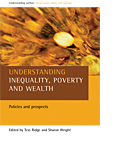
Understanding inequality, poverty and wealth:
Policies and Prospects
Edited by Tess Ridge and Sharon Wright, June 2008, 360 pages, Paperback (ISBN 9781861349149), Hardback (ISBN 9781861349156). Paperback £15.99, Hardback £48.00. Published by The Policy Press Series: Understanding Welfare: Social Issues, Policy and Practice series.
"This volume provides a timely and much-needed critical account of the inter-relationship between 'the problem of poverty' and 'the problem of riches'. Combining both conceptual, empirical and policy perspectives and a UK and global focus, it offers rich pickings for students and all who are concerned about poverty and inequality."
— Ruth Lister, Professor of Social Policy, Loughborough University, author of 'Poverty' (Polity, 2004)
Synopsis: This major new textbook provides students with a critical understanding of poverty and social exclusion in relation to wealth, rather than as separate from it.
Full Description: At a time when the divide between the wealthy and the disadvantaged is widening, this major new textbook provides students with a critical understanding of poverty and social exclusion in relation to wealth, rather than as separate from it. Raising fundamental questions about the organisation of society, social structures and relationships and social justice, the book is split into four main sections exploring key concepts and issues; 'people and place' (poverty and wealth across different groups and situations); the role of the state; and prospects for the future. Features:
- the only textbook to focus on the links between wealth and poverty
- an edited collection of chapters specially written by a distinguished panel of contributors including Pete Alcock, Daniel Dorling, Mary Shaw, Gill Scott and Jay Ginn
- designed with the needs of students in mind and includes useful chapter summaries, illustrative boxes and diagrams, and pointers to relevant websites and other sources of further information
It will be an essential textbook for level 1/2 undergraduate students studying social policy either as a main subject or as part of their course. It would be a core text for level 3/4 specialist modules in this field. Understanding welfare: Social issues, policy and practice series Series Editor: Saul Becker, University of Nottingham.
This bestselling series presents topical and innovative approaches to understanding social issues, policies and welfare delivery from leading experts. Accessible and student friendly, each includes chapter-specific summaries, questions for discussion, illustrative boxes and diagrams to help understanding and full bibliographies. Each book is Social Policy Subject Benchmark compliant, and with an attractive series design this collection builds into a library of essential reading for students. For other titles in this series, please follow the series link from the main catalogue page.
Tess Ridge is a Lecturer in Social Policy at the University of Bath. Her main research and teaching interests are poverty and social exclusion - especially childhood poverty and social exclusion - children and family policy, social security policy and comparative social security especially support for children and families. Tess is a trustee of the Child Poverty Action Group and Honorary Secretary of the Social Policy Association. Publications include Ridge, T (2002) Childhood Poverty and Social Exclusion, Bristol: Policy Press.
Dr Sharon Wright is Lecturer in Social Policy at the University of Stirling. Her research interests are in poverty, social security, the processes of making and implementing social policy, service delivery, unemployment and active labour market policies. Her teaching interests are in social policy; poverty, income and wealth; gender, work and welfare and qualitative research methods. Sharon is Managing Co-Editor of the journal Social Policy & Society and Co-convenor of the Scottish Social Policy Network.
Contents: Introduction ~ Tess Ridge and Sharon Wright; Wealth ~ Karen Rowlingson; Poverty and social exclusion ~ Pete Alcock; Explaining poverty, Social exclusion and inequality: towards a structural approach ~ Gerry Mooney; Global inequality, poverty and wealth ~ Nicola Yeates; Spatial divisions of poverty and wealth ~ Danny Dorling and Dimitris Ballas; Gender, poverty and wealth ~ Gill Scott; The intersection of ethnicity, Poverty and wealth ~ Akwugo Emejulu; Childhood and youth ~ Petra Hoelscher; Poverty and financial inequality in later life ~ Jay Ginn; Health and disability ~ Mary Shaw, Ben Wheeler, Richard Mitchell and Danny Dorling; State approaches to wealth ~ Michael Orton; State approaches to poverty and social exclusion ~ Tess Ridge and Sharon Wright; Conclusions: policies and prospects ~ Tess Ridge and Sharon Wright.

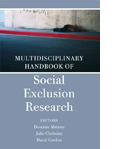
Multidisciplinary Handbook of
Social Exclusion Research
Edited by Dominic Abrams, Julie Christian and
David Gordon
"Social exclusion has become, along with poverty, human rights and development, one of the key concepts of scientific social research. Meaning has to be unravelled, and measurement and explanation better devised. Readers will value this searching and comprehensive handbook.”
— Professor Peter Townsend, London School of Economics
Synopsis: Social exclusion remains a key problem nationally and globally for policy makers, researchers and professionals. In spite of its prominence, social exclusion policy debate lacks a dominant disciplinary focus. This innovative book covers evidence from key research and policy to provide readers with cross-disciplinary perspectives on major areas of social exclusion.
The book describes the international context and framework for analysing social exclusion in social research, the history of such research, and the social and psychological components of social exclusion. Different chapters review and critically analyse social exclusion research in particular domains (education, health, children in care, crime, business, race and ethnicity). All chapters propose practical implications and policy recommendations that follow. The book concludes with an integrative framework for analysing social exclusion, reflecting the interplay and connection between exclusion at different levels of analysis.
Contents: Social Exclusion and Social Policy Research (Jane Millar); Women's Social Exclusion (Diane Houston); The Social Psychology of Exclusion (Paul Hutchison et al.); Stigma and Exclusion in Healthcare Settings (Elizabeth Mason-Whitehead & Tom Mason); Homelessness and Social Exclusion (David Clapham); Education and Social Exclusion (Peter Hick et al.); Care Leavers, Exclusion & Access to Higher Education (Sonia Jackson); Social Exclusion and Crime (Chris Hale & Marian Fitzgerald); Social Inclusion, Race and Ethnicity Policies (Greville Percival); Business and Social Inclusion (Ken Peattie); History and Development of Social Exclusion and Policy (David Gordon); A Relational Analysis of Social Exclusion (Dominic Abrams & Julie Christian)
The cross-disciplinary approach offered in the Multidisciplinary Handbook of Social Exclusion Research gives it a broad appeal across a range of professions and disciplines. It will be an unrivalled reference on social exclusion for academics and practitioners in areas including psychology, education, housing, political science, healthcare, sociology, social policy and law.

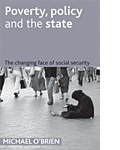
Poverty, policy and the state
By Mike O'Brien, November 2007, 288 pages, Hardback (ISBN 9781861347992), £48.00. Published by The Policy Press.
"This volume addresses a major area of interest in recent social policy discussions about restructuring modern welfare states and the question of 'rolling back' an advanced welfare system. It is an important work for readers both within New Zealand and internationally."
— Tapio Salonen, Professor in Social Work, Växjö University, Sweden
Synopsis: New Zealand has experienced both sweeping economic and social reform and growing poverty and income inequality in the last twenty years. This book explores the changes to social security provision and coverage in the context of these developments and of widening national and international poverty and inequality.
Full Description: New Zealand has experienced both sweeping economic and social reform and growing poverty and income inequality in the last twenty years. This book explores the changes to social security provision and coverage in the context of these developments and of widening national and international poverty and inequality. The book argues that the policy initiatives have altered the nature of social security and in doing so have significantly transformed the nature of social citizenship. The author brings the New Zealand data together in a way that has not been done previously and provides the reader with both a detailed discussion of the work on poverty and living standards in New Zealand and the political and economic context within which social security changes have occurred. Linking the discussion to international changes in social security and to the international literature on poverty and inequality, the author demonstrates the important implications the New Zealand directions have for the development of social security internationally. The book will be of considerable interest for all those interested in international reshaping of state support for the poorest and most vulnerable and its development in a neoliberal and Third Way.
Michael O'Brien is senior lecturer at the School of Social and Cultural Studies, Massey University, New Zealand.
Contents: Part one: The contexts of reform: Introduction; Mapping the territory: A brief historical review; Defining and measuring inequality and poverty; Facing the greatest risk of poverty: Who?; Poverty and low living standards: Effects and impacts; Part two: The changing policy directions: Politics, globalisation and social security; The fourth Labour government:1984-90; National and national-led government:1990-99; The early twenty first century: Labour led developments; Social security: How social, how secure; Bibliography.

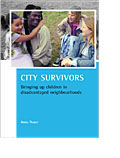
City Survivors:
Bringing up children in disadvantaged neighbourhoods
By Anne Power, November 2007, 232 pages, Paperback (ISBN 9781847420497) Hardback (ISBN 9781847420503), Paperback £17.59, Hardback £52.00. Published by The Policy Press.
"Anne Power has built up a formidable reputation for grasping the daily dilemmas of Britain's poor neighbourhoods and this book is one of her best. It's a vivid portrait of the struggles so many people face, and brilliantly uses its ethnographic material to show how much people's quality of life depends on others - in the family, the neighbourhood and the wider society."
— Geoff Mulgan, Director, The Young Foundation
"Anne Power's illuminating and important book bears witness to the lives of urban families, without whose presence all cities would wither and decline. The parents she interviews describe in detail how noisy, messy, often unsafe environments inform every decision they make about their lives and those of their children. If Power's recommendations, based on interviews with 200 'city survivors', are heeded, families may no longer have to 'survive' the city, but instead will thrive in it."
— Lynsey Hanley, author of 'Estates: An Intimate History'
Synopsis: This book provides a unique insider view on the impact of neighbourhood conditions on family life and explores the prospects for families from the point of view of equality, integration, schools, work, community, regeneration and public services.
Full Description: Seen through the eyes of parents, mainly mothers, City survivors tells the eye-opening story of what it is like to bring up children in troubled city neighbourhoods. The book provides a unique insider view on the impact of neighbourhood conditions on family life and explores the prospects for families from the point of view of equality, integration, schools, work, community, regeneration and public services.
City Survivors is based on yearly visits over seven years to two hundred families living in four highly disadvantaged city neighbourhoods, two in East London and two in Northern inner and outer city areas. Twenty four families, six from each area, explain over time from the inside, how neighbourhoods in and of themselves directly affect family survival. These twenty four stories convey powerful messages from parents about the problems they want tackled, and the things that would help them. The main themes explored in the book are neighbourhood, community, family, parenting, incomes and locals, the need for civic intervention.
The book offers original and in-depth, qualitative evidence in a readable and accessible form that will be invaluable to policy-makers, practitioners, university students, academics and general readers interested in the future of families in cities.
Anne Power is Professor of Social Policy at the London School of Economics and Political Science; Sustainable Development Commissioner responsible for regeneration and sustainable communities; member of the Government's Urban Task Force; author of books on cities, communities and marginal housing areas in the UK and abroad.
Contents: Introduction: city survivors; Neighbourhoods matter: is it the people or the place?; Community matters: survival, instincts in social animals; Families matter: mothers carry the weight; Parenting matters: pushing for kids; Incomers and locals: a shrinking pot?; City survival within precarious communities: who pays the price of change?; Conclusion: cities need families.

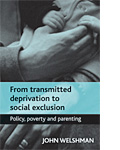
From transmitted deprivation to social exclusion:
Policy, poverty and parenting
By John Welshman, September 2007, 320 pages, Hardback (ISBN 9781861348357), £52.00. Published by The Policy Press.
"This is an absorbing book. Using archive material well, it throws light on the relationship between social research, its funding and its use by politicians. It also shows the continuity of ideas in social policy - though new terms like social exclusion may come into vogue, the thread of ideas over time remains."
— Howard Glennerster, London School of Economics and Political Science
"John Welshman's focus is on the origins of Keith Joseph’s analysis in the 1970s, the direction of the government-funded research program that followed it and on the connections between ideas in the 1970s and New Labour’s approach to tackling poverty, social exclusion and anti-social behavior. He takes the perspective of a social historian, relying primarily on published documents, extensive archival research and interviews. He provides an in-depth case study of the political process from a variety of perspectives."
— Nick Axford, Prevention Action website.
Synopsis: This book explores the history of debates over 'transmitted deprivation' and their relationship with current initiatives on social exclusion. Acknowledging the intellectual debt that New Labour owes to Sir Keith Joseph, the author highlights the striking similarities between the Government's most recent attempts to tackle social exclusion and child poverty and earlier debates.
Full Description: John Welshman's new book fills a major gap in social policy: the history of debates over 'transmitted deprivation', and their relationship with current initiatives on social exclusion.
The book explores the content and background to Sir Keith Joseph's famous 'cycle of deprivation' speech in 1972, examining his own personality and family background, his concern with 'problem families', and the wider policy context of the early 1970s. Tracing the direction taken by the DHSS-SSRC Research Programme on Transmitted Deprivation, it seeks to understand why the Programme was set up, and why it took the direction it did. With this background, the book explores New Labour's approach to child poverty, initiatives such as Sure Start, the influence of research on inter-generational continuities, and its new stance on social exclusion. The author argues that, while earlier writers have acknowledged the intellectual debt that New Labour owes to Joseph, and noted similarities between current policy approaches to child poverty and earlier debates, the Government's most recent attempts to tackle social exclusion mean that these continuities are now more striking than ever before.
Making extensive use of archival sources, private papers, contemporary published documents, and oral interviews with retired civil servants and social scientists, Policy, Poverty and Parenting is the only book-length treatment of this important but neglected strand of the history of social policy. It will be of interest to students and researchers working on contemporary history, social policy, political science, public policy, sociology, and public health.
John Welshman is Senior Lecturer in Public Health at the Institute for Health Research, Lancaster University, UK.
Contents: Introduction; Part One: The cycle hypothesis: Sir Keith Joseph and the cycle speech; From problem families to the cycle of deprivation; Part Two: The Transmitted Deprivation Research Programme: Conceptual difficulties: setting up the Research Programme; From a cycle of deprivation to cycles of disadvantage; The final years of the Research Programme, Poverty, structure, and behaviour: three social scientists; Part Three: New Labour and the cycle of deprivation: The broader context: social exclusion, poverty dynamics, and the revival of agency; From transmitted deprivation to social exclusion; Conclusion.

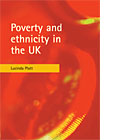
Poverty and Ethnicity in the UK
By Lucinda Platt, April 2007, 152 pages, Paperback (ISBN 9781861349897), £12.76. Published by The Policy Press.
Free PDF version available at www.jrf.org.uk
Synopsis: A wide-ranging review of the literature relating to poverty and ethnicity has identified the stark differences in rates of poverty according to ethnic group. This review brings together all the available evidence on different aspects of poverty and examines what has (and has not) been studied in relation to its causes.
Full Description: Poverty rates vary dramatically across the UK's ethnic groups - an issue of concern both for poverty-reduction policies and for social justice. This book provides a comprehensive account of these variations and explores the reasons why they occur.
Drawing on a wealth of research conducted since 1991, and with a particular focus on the most recent evidence, the report reviews what we know about poverty and ethnicity and provides a detailed and considered insight into the factors contributing to the differing rates of poverty. In addition to outlining the policy implications of existing research, the author also reflects on the limitations to our knowledge and understanding of the issues, which serves as a useful framework for a future research agenda.
The book is valuable both as a comprehensive assessment of the topic and as an up-to-date and searchable resource on relevant research writings. It is essential reading for all those wishing to know more about ethnic differences in poverty experience and the contributing factors. It provides a sophisticated reading of the literature for students and researchers and a policy-informed take on the research for policy-makers.
Lucinda Platt is Senior Lecturer in Sociology at the Institute for Social and Economic Research, University of Essex. Her research focuses on issues relating to minority ethnic groups and on child poverty. She is the author of Discovering child poverty, published by The Policy Press in 2005.
Contents: Introduction Part I: Concepts and definitions: Ethnicity and ethnic groups; Poverty and deprivation Part II: The facts of poverty: Poverty and ethnicity: the evidence Part III: Explaining ethnic differences in poverty: Income from employment; Family structure and kinship; Access to and use of social security benefits Part IV: Implications: Implications for policy; Implications for research.

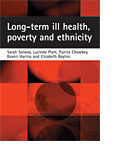
Long-term ill health, poverty and ethnicity
By Sarah Salway, Lucinda Platt, Punita Chowbey, Kaveri Harriss and Elizabeth Bayliss, April 2007, 104 pages. Paperback (ISBN 9781861349934), £12.76. Published by The Policy Press
Free PDF version available at www.jrf.org.uk
Synopsis: Chronic ill-health is now recognised as a major public health and social welfare issue, with significant new policy initiatives in recent months. This report presents findings from a detailed new investigation into the experiences of individuals living with long-term ill-health and their families. New in-depth qualitative material is combined with secondary analyses of national datasets to examine the ways in which long-term ill-health impacts upon different dimensions of poverty.
Full Description: Chronic ill-health is now recognised as a major public health and social welfare issue, with significant new policy initiatives in recent months.
This report presents findings from a detailed new investigation into the experiences of individuals living with long-term ill-health and their families. New in-depth qualitative material is combined with secondary analyses of national datasets to examine the ways in which long-term ill-health impacts upon different dimensions of poverty. The report:
- Explores the links between long-term ill-health and three inter-related areas: employment, welfare benefits and social participation and social support.
- Covers an ethnically diverse sample in order to explore, though not assume, the relevance of ethnicity for the experience and consequences of long-term ill-health.
- Identifies ways in which current UK health and social policy might better serve the needs of people with long-term health conditions.
This accessible report is of importance to policy-makers and practitioners working across the public health and social welfare arenas. The findings are of relevance to a wide range of programme areas including: access to employment, welfare benefits, chronic illness self-management (Expert Patients Programmes) and ethnic minority disadvantage. Researchers and students will also find the report of interest.
Sarah Salway is Principal Research Fellow in the Centre for Health and Social Care Research, Sheffield Hallam University. Lucinda Platt is Senior Lecturer in Sociology at the Institute for Social and Economic Research at the University of Essex. Punita Chowbey is Research Associate, School of Nursing and Midwifery, University of Sheffield. Kaveri Harriss is a doctoral student in the Centre for Population Studies, London School of Hygiene and Tropical Medicine. Elizabeth Bayliss is Executive Director, Social Action for Health.
Contents: Executive summary; Background and methodology; Family, community and society: placing long-term health conditions in context; Individual experiences of long-term ill-health: barriers and supports to 'resilience'; Long-term health conditions and employment; Long-term health conditions and welfare benefits; Long-term health conditions and social participation; Relevance of findings for national policy.

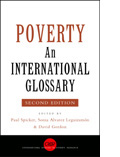
Poverty
An International Glossary (Second Edition)
Edited by Paul Spicker, Sonia Alvarez Leguizamn and David Gordon, January 2007, Hardback: £50.00 ISBN: 9781842778227, Paperback: £16.99 ISBN: 9781842778234. Published by Zed Books Series Title: International Studies in Poverty Research Series.
"An indispensable guide ... Spicker’s final chapter is a masterly review of
the subject."
— David Donnison, Emeritus Professor at the University of Glasgow
"Surprisingly compact, this succinct lexicon explains over 200 technical terms that the student or practitioner of international development should aim to be able to quote verbatim. Overall, the Glossary contains concise and enlightening explanations, like "Fourth World", referring to chronically deprived communities in developed countries, and definitions of poverty in Islam and the Arab world. This second edition also invites Latin American scholars to the editorial board, both to highlight the variance in poverty definitions around the world, and to challenge, as the foreword acknowledges, the first edition's exclusively Western paradigm...the Glossary illustrates the scope of poverty analysis and, with its thorough referencing, both directs and impels the reader to further study."
— New Agriculturalist
Synopsis: This second edition of this highly-successful glossary provides an exhaustive and authoritative guide to over 200 technical terms used in contemporary scholarly research on poverty. It seeks to make researchers, students and policy makers aware of the multi-dimensional character of this social condition. The new edition includes a range of entries to keep pace with an expanding field of discourse, an expanded set of references and further perspectives from developing countries. A special effort has been made to incorporate non-Western approaches and concepts.
Paul Spicker holds the Grampian Chair of Public Policy at the Robert Gordon University, Aberdeen, and is Director of the Centre for Public Policy and Management. Sonia Alvarez Leguizamón is Associate Professor of Urban Anthropology in the Faculty of Humanities, National University of Salta, Argentina. David Gordon is Director of the Townsend Centre for International Poverty Research, University of Bristol.
Contents: Introducing the glossary - Else Øyen Poverty: An International Glossary Definitions of poverty: twelve clusters of meaning - Paul Spicker Contributors Index
This book is used for teaching at the following institutions: University of Southampton

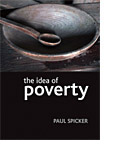
The idea of poverty
By Lucinda Platt, April 2007, 152 pages. Paperback (ISBN 9781861349897), £12.76. Published by The Policy Press.
"This book does two things and does both of them well. First, it provides a comprehensive, well written, and coherent overview of 'the idea of poverty' or perhaps rather of the 'ideas' of poverty, in terms both of concepts of poverty and the evidence about poverty. As such it is both an excellent text for students who must consider poverty and a useful general resource. Second, the author has his own clear views, expresses them well, and in the best tradition maintains a clear difference between opinion and his account of poverty as a whole. This is an important addition to the literature."
— David Byrne, University of Durham, UK
Synopsis: Making a committed argument for a participative, inclusive understanding of the term, Paul Spicker examines views about what poverty is and what should be done about it.
Spicker's previous work in this field has been described as "entertaining and sometimes controversial", and his new book certainly lives up to this. Some of the book's ideas are complex and will be of particular interest to academics and others working in the field, but the book has been written mainly for students and the interested general reader. It challenges many of the myths and stereotypes about poverty and the poor, and helps readers to make sense of a wide range of conflicting and contradictory source material.
Paul Spicker holds the Grampian Chair of Public Policy at the Robert Gordon University, Aberdeen and is the Director of the Centre for Public Policy and Management. His research has mainly focused on issues related to poverty, need, disadvantage and service delivery, and he has undertaken a range of applied work on social welfare issues.
Full Description: This book examines views about what poverty is and what should be done about it. 'Poverty' means many different things to different people - for example, material deprivation, lack of money, dependency on benefits, social exclusion or inequality. In The idea of poverty, Paul Spicker makes a committed argument for a participative, inclusive understanding of the term.
Contents: Part one: Understanding poverty: Defining poverty; Poverty in different societies; Understanding the figures; Part two: Poverty as material need: Concepts of need; Area deprivation; Part three: Poverty as economic position: Economic resources; Class; Part four: Poverty and social relationships: Social exclusion; Dependency; Poverty and politics; Part five: Poverty as a moral concept: The moral dimensions of poverty; The moral condemnation of the poor; Part six: Explanations for poverty: Why people are poor; Why poor countries stay poor; Part seven: Responses to poverty: Responding to poverty; Policies for poverty.

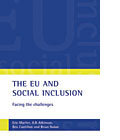
The EU and social inclusion
Facing the challenges
By Eric Marlier, Tony Atkinson, Bea Cantillon and Brian Nolan, November 2006 , 328 pages, Hardback (ISBN 9781861348845), £52.00. Published by The Policy Press
"The EU Heads of State and Government have committed in Lisbon to making a decisive impact on the eradication of poverty by 2010. Even though the tools for fighting poverty and social exclusion rely primarily upon national actors, the Union is an active catalyst of their wills through sharpening diagnoses and highlighting the ways forward. The Union needs to become more aware of the linkages between its economic responsibilities and social cohesion. For this there is nothing more important than rigorous quantitative vigilance, of which this book is a clear illustration."
— Jacques Delors, former President of the European Commission, 1985-1995
"... the book performs a valuable service in covering so much ground so thoroughly."
— Journal of Social Policy
"...this book addresses fundamental principles and policies underpinning our work."
— British Journal of Social Work
"The clear setting and exposition of this book will ensure it proves a valuable resource to all actors engaged with the EU Social Inclusion Process and researchers in Social Policy and European Studies."
— Journal of Common Market Studies
"...the most authoritative account of the evolution of the indicators, their potential for analysis and the areas in which they could be strengthened."
— 'The renewed Lisbon Strategy and social exclusion policy', Industrial Relations Journal
Synopsis: Social cohesion is one of the declared objectives of the European Union and, with some 16% of EU citizens at risk of poverty, the need to fight poverty and social exclusion continues as a major challenge. This book provides an in-depth analysis of the EU Social Inclusion Process, the means by which it hopes to meet this objective, and explores the challenges ahead at local, regional, national and EU levels. It sets out concrete proposals for taking the Process forward.
Full Description: Social cohesion is one of the declared objectives of the European Union and, with some 16% of EU citizens at risk of poverty, the need to fight poverty and social exclusion continues as a major challenge. This book provides an in-depth analysis of the EU Social Inclusion Process, the means by which it hopes to meet this objective, and explores the challenges ahead at local, regional, national and EU levels. It sets out concrete proposals for taking the Process forward.
The book provides a unique analysis of policy formulation and assessment. Setting out the evolution and current state of EU cooperation in social policy, it examines what can be learned about poverty and social exclusion from the EU commonly agreed indicators. Taking the position of outside, but informed, observers, the authors explore the further development of the common indicators, including the implications of Enlargement, and consider the challenges of advancing the Social Inclusion Process - strengthening policy analysis, embedding the Process in domestic policies and making it more effective. Proposing the setting of targets and restructuring of National Action Plans and their implementation, they emphasise the need for widespread "ownership" of the Process at domestic and EU level and for it to demonstrate significant progress in reducing poverty and social exclusion.
The book will be invaluable to academics, students and policy-makers at sub-national, national and EU levels as well as to social partners, and NGOs working towards a more inclusive society.
Tony Atkinson is currently holder of a Chaire Blaise Pascal at the Paris School of Economics, and was Warden of Nuffield College, Oxford from 1994 to 2005. Bea Cantillon is Professor and Director of the Centre for Social Policy at the University of Antwerp, Belgium. Eric Marlier is the international scientific advisor of the CEPS/INSTEAD Research Institute, Luxembourg, and is regularly called as an international policy advisor on the Social Inclusion Process. Brian Nolan is Research Professor and Head of the Social Policy Research Division at the Economic and Social Research Institute (ESRI), Ireland.
Contents: Introduction: The EU Social Inclusion Process and the key issues; Exploring statistics on poverty and social exclusion in the EU; Strengthening policy analysis; EU indicators for poverty and social exclusion; Taking forward the EU Social Inclusion Process; The EU and Social Inclusion: facing the challenges.

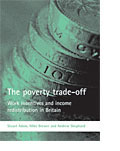
The poverty trade-off:
Work incentives and income redistribution in Britain
By Stuart Adam, Mike Brewer and Andrew Shephard, October 2006. 64 pages, Paperback (ISBN 9781861348630), £10.36. Published by The Policy Press.
Free PDF version available at www.jrf.org.uk
"The report is full of useful research results which will be of interest to anyone who wants to study in detail the ways in which tax and benefit changes affect financial incentives to enter the employment market or progress within it."
— Citizen's Income, issue 3, 2007-11-19
Synopsis: Two strategies that governments have to help people on low incomes - providing them with financial support directly, and encouraging them to earn more - generally conflict. This report provides new evidence on the trade-off between redistributing income and improving work incentives.
Full Description: Two strategies that governments have to help people on low incomes - providing them with financial support directly, and encouraging them to earn more - generally conflict. This report provides new evidence on the trade-off between redistributing income and improving work incentives.
Drawing on large-scale survey data spanning the last 26 years, the report analyses the incomes and work incentives facing thousands of individuals and families, and how they are affected by the tax and benefit system. It:
- shows how work incentives vary across the population and how this has changed since 1979;
- estimates how far tax and benefit reforms have been responsible for changes in work incentives;
- compares these trends with trends in poverty and inequality;
- examines how various policy options for the future would affect the distributions of both income and work incentives.
The report is aimed at policy-makers, academics and students in the field of taxation and welfare reform, and all those who wish to improve their understanding of the trade-off between redistributing income and improving work incentives.
Stuart Adam is a senior research economist, Mike Brewer a programme director and Andrew Shephard a PhD scholar, all at the Institute for Fiscal Studies. They conduct research into how tax and benefit policies affect households in the UK.
Contents: Introduction; Measuring financial work incentives; Financial work incentives in Britain 1979-2005; Poverty, inequality and work incentives over time; The effects of possible tax and benefits reforms on work incentives and the distribution of income; Conclusion.

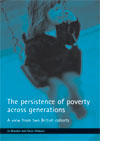
The persistence of poverty over generations:
A view from two British cohorts
By Paul Spicker, January 2007, 184 pages, Paperback (ISBN 9781861348883) Hardback (ISBN 9781847420503), Paperback £112.79, Hardback £44.00. Published by The Policy Press
Free PDF version available at www.jrf.org.uk
"...the most authoritative account of the evolution of the indicators, their potential for analysis and the areas in which they could be strengthened."
— The renewed Lisbon Strategy and social exclusion policy, Industrial Relations Journal
Synopsis: The recent focus on reducing the extent of child poverty in the UK stems mainly from worries about the future consequences of poverty on children's later achievement. With this background in mind, it is clearly crucial to improve our understanding of the costs of growing up poor. This report explores the strength of the link between childhood poverty and poverty later in life, and asks whether this link has grown stronger or weaker in recent decades.
This report uses information on the incomes of two British cohorts to address the following questions:
- How large is the transmission of poverty between a teenager's parents' circumstances and their own circumstances when they are in their early 30s?
- By how much has the strength of this transmission of poverty changed between the two cohorts that were teenagers in the 1970s and the 1980s?
- How far do the effects of early disadvantage continue to be felt as individuals reach middle age?
This report will be of interest to policy makers and academics who are concerned with understanding the factors that shape the life-chances of poor children.
Jo Blanden is a lecturer in economics at the University of Surrey. She was formerly a research officer at the Centre for Economic Performance at the London School of Economics while carrying out this research and remains a research associate at the Centre.
Steve Gibbons is a lecturer in the Department of Economic Geography at the London School of Economics. He is a research associate at the Centre for Economic Performance.
Full Description: The recent focus on reducing the extent of child poverty in the UK stems mainly from worries about the future consequences of poverty on children's later achievement. With this background in mind, it is clearly crucial to improve our understanding of the costs of growing up poor. This report explores the strength of the link between childhood poverty and poverty later in life, and asks whether this link has grown stronger or weaker in recent decades.
Contents: Introduction; Measuring poverty; The persistence of poverty from childhood to adulthood; The persistence of poverty from teens to middle age; Poverty and disadvantage in childhood and adulthood; Explaining the persistence of poverty and its change over time; Summary and policy recommendations.

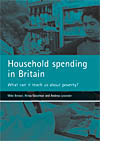
Household spending in Britain:
What can it teach us about poverty?
By Mike Brewer, Alissa Goodman and Andrew Leicester, April 2006, 48 pages. Paperback (ISBN 9781861348548), £10.36. Published by The Policy Press.
Free PDF version available at www.jrf.org.uk
Synopsis: Much of the recent policy debate surrounding poverty in Britain focuses on income as a measure of living standards. In this report we consider one alternative to income for measuring poverty that has been largely overlooked in the mainstream poverty debate in the UK: namely household expenditure.
Full Description: Much of the recent policy debate surrounding poverty in Britain focuses on income as a measure of living standards. In this report we consider one alternative to income for measuring poverty that has been largely overlooked in the mainstream poverty debate in the UK: namely household expenditure.
Economic theory suggests that household expenditure is an important measure of financial well-being. Using 30 years of data from household surveys, this report:
- shows the trends in poverty in Britain since the 1970s when household expenditure is used as a measure of financial well-being, rather than household income;
- investigates how using spending, rather than income, as a measure of well-being alters our view of who is poor;
- examines the spending levels of the lowest-income households;
- analyses whether low-income pensioners' spending on basic and non-basic items increased as a result of the large increases in entitlements to means-tested benefits since 1999.
The research will be of interest to civil servant policy-makers, academics and researchers working on poverty issues, and other groups with an interest in anti-poverty policies.
Mike Brewer and Alissa Goodman are Programme Directors, and Andrew Leicester is a senior research economist, all at the Institute for Fiscal Studies, UK.
Contents: Introduction; Income and expenditure poverty compared; Income and expenditure behaviour of the same households; The effect of increased benefit entitlements on pensioner spending; Conclusions and policy implications.

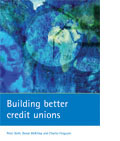
Building better credit unions
By Peter Goth, Donal McKillop and Charles Ferguson, Feburary 2006, 64 pages. Paperback (ISBN 9781861348296), £9.36. Published by The Policy Press.
Free PDF version available at www.jrf.org.uk
Synopsis: In the UK there is increasing acceptance that credit unions have a potentially important role to play in the provision of affordable credit to all sections of society, including those facing financial exclusion. Against this backdrop, this study seeks to identify current patterns of credit union development, quantify the performance of credit unions and isolate those factors which make some credit unions more successful than others.
Full Description: In the UK there is increasing acceptance that credit unions have a potentially important role to play in the provision of affordable credit to all sections of society, including those facing financial exclusion. Against this backdrop, this study seeks to identify current patterns of credit union development, quantify the performance of credit unions and isolate those factors which make some credit unions more successful than others.
The study considers the financial profile of UK credit union movement, examining the relative performance of credit unions for the UK as a whole and separately for Northern Ireland, Scotland, England and Wales. It also uses case studies to explore key trends within the sector, including consideration of recently established 'fast growth' credit unions, which have received pump priming from their local authorities, as well as a number of merging credit unions. Building better credit unions:
- provides descriptive statistics conceptualising the UK credit union movement;
- outlines the differences in the profile of credit union penetration within the main UK regions;
- considers recent legislative amendments;
- investigates why some credit unions perform much better than others
- identifies a series of policy recommendations needed to strengthen the sector.
This report will be invaluable to the management and board of individual credit unions, the decision makers in the various credit union trade associations, the credit union regulator and policy makers in the arena of financial inclusion in central and local government.
Peter Goth is a researcher at Queen's University Belfast. Donal McKillop is Professor of Financial Services at Queen's University Belfast. Charles Ferguson is Senior Policy Adviser with Volunteer Development Scotland
Contents: Introduction; UK credit unions (structure, legislation and financial exclusion); Performance measurement; Newly formed 'fast growth' credit unions; Case study analysis of UK credit union mergers; Factors driving differential credit union performance; Summary and recommendations.

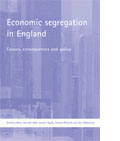
Economic Segregation in England:
Causes, consequences and policy
By Geoffrey Meen, Kenneth Gibb, Jennifer Goody, Thomas McGrath and Jane Mackinnon, Feburary 2006, 64 pages. Paperback (ISBN 9781861348135), £10.36. Published by The Policy Press.
Free PDF version available at www.jrf.org.uk
Synopsis: One of the key objectives of government neighbourhood policy is to encourage a sustainable mix of tenures and incomes. This report addresses questions of why integration has been so difficult to achieve in practice and draws conclusions for future policy.
Full Description: One of the key objectives of government neighbourhood policy is to encourage a sustainable mix of tenures and incomes. This report addresses questions of why integration has been so difficult to achieve in practice and draws conclusions for future policy.
The report analyses data from three related empirical studies. The first models, locally, the links between housing, labour markets, migration, deprivation and segregation. The second examines the factors behind the individual moving decisions that lie at the heart of segregation and how policy can influence choices. The third presents three case studies. These are the first empirical studies of their kind to show how segregation and deprivation arise.
Economic segregation in Britain is aimed at policy practitioners, economists and academics working in the fields of housing and neighbourhood revitalisation. Although the report deals with technical modelling issues, it is written in a style accessible to the non-specialist.
Geoffrey Meen is Professor of Applied Economics at The University of Reading, UK. Kenneth Gibb is Reader and Head of the Department of Urban Studies at the University of Glasgow, UK. Jennifer Goody is a management consultant and partner in the Peter Brown Partnership, UK, specialising in data analysis. Thomas McGrath is a research officer at The University of Reading. Jane Mackinnon is a research associate at the University of Glasgow.
Contents: Introduction; Concepts and methods; Are mixed communities desirable? The poverty of place; The patterns of segregation in England; The dynamics of local housing markets; Migration and location; Explaining patterns of segregation and deprivation; Mixed communities: evidence from case studies; Golden rules for developing mixed communities.

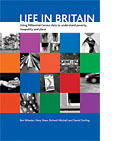
Life in Britain:
Using Millennial Census data to understand
poverty, inequality and place
By Ben Wheeler, Mary Shaw, Richard Mitchell and Daniel Dorling, September 2005. Paperback (ISBN 9781861347732), £23.99. Published by The Policy Press.
Free PDF version available at www.jrf.org.uk
"Brilliant! I like the style and the content, which dissects and interprets census data in a way that provides bite-sized chunks ideal for students. The clear layout conveys a wealth of information in an accessible format."
— Sharon Wright, Department of Applied Social Science, University of Stirling
"If academic subjects were hung on a Christmas tree, geography would be the star on top and Life in Britain the box of delights below."
— BMJ
Synopsis: This lively, colourful and innovative pack presents ten reports on key issues affecting life in Britain. Covering topics including education, housing, health, family and work the reports show key patterns and inequalities, as revealed by the 2001 Census. Designed specifically for use as a teaching aid and learning resource, the reports are accompanied by a summary sheet, five striking posters and a detailed technical report offering background information.
Full Description: This lively, colourful and innovative pack has been designed specifically for use as a teaching aid and learning resource for students of geography, sociology, social policy and related social science disciplines. With new evidence about the nature of social and geographical divisions in British society, it is also an invaluable resource for policy makers and local authority professionals in areas such as planning, education, housing, poverty and social exclusion.
The topics selected are central to themes covered both at undergraduate and A-level and focus on the differences between areas within the UK, highlighting the spatial inequalities and gaps in service provision that the census data have revealed.
The pack contains a range of valuable learning materials, including:
- A summary sheet (A4, 2 pages)
- 10 short reports (A4, 8 pages each)
- 5 full colour A2 posters (photos, text and maps depicting life in contemporary Britain and focusing on housing, poverty, employment, education and health)
- A technical report (giving the background to the project and details of the analyses)
Ben Wheeler is Research Fellow in the Department of Geography, University of Sheffield. Mary Shaw is Reader in Medical Sociology in the Department of Social Medicine, University of Bristol. Richard Mitchell is Research Fellow in the Research Unit in Health, Behaviour and Change, University of Edinburgh Medical School. Danny Dorling is Professor of Human Geography at the University of Sheffield.
Contents: Summary sheet + 5 A3 posters + technical report + 10 reports: A place in the sun; Changing rooms; Doctors and nurses; Home front; Open all hours; Sickness and health; Sons and daughters; Teachers; The office; Top gear.

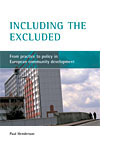
Including the excluded:
From practice to policy in European community development
By Paul Henderson, June 2005, 144 pages. Paperback (ISBN 9781861347459), £11.99. Published by The Policy Press.
Free PDF version available at www.jrf.org.uk
"This useful book draws on a range of experiences across Europe to present some practical strategies for working with communities to promote social inclusion. It brings to life a frequently neglected area of policy and demonstrates the importance of working closely with those who experience poverty and discrimination to tackle complex and seemingly intractable problems."
— Alison Gilchrist, Director, Practice Development, Community Development Foundation
"Paul Henderson's book makes a helpful contribution to the literature on community development in the industrial countries. ... [he] shows how different European countries have successfully adopted community development principles. He provides seven case studies of community development projects in several countries... it [the book] contains a good deal of useful information. Its account of community development in Europe will be of interest not only to European readers but also to those in other parts of the world... His ability to combine theoretical ideas with practical examples is particulrly impressive and the book should appeal to practitioners and academics alike. Students will also find it helpful. It deserves to be widely consulted."
— Social Development Issues, Vol. 28 (1)
Synopsis: This book provides an in-depth study of how community development can contribute to tackling social exclusion. Examples from policy and practice in the UK, Spain, Belgium, Sweden and Norway are discussed, with additional information from Denmark, Ireland and Hungary.
Full Description: This book provides an in-depth study of how community development can contribute to tackling social exclusion. Drawing on the outcomes of a project funded by the Social Inclusion Programme of the European Union and managed by a European network of community development organisations - the Combined European Bureau for Social Development - Including the excluded:
- analyses the experiences of local communities;
- identifies and explains the key principles that need to underpin programmes and projects that use a community-based approach to tackling social exclusion;
- provides a summary of key action points that need to be considered by organisations and agencies.
Examples from policy and practice in the UK, Spain, Belgium, Sweden and Norway are discussed, with additional information from Denmark, Ireland and Hungary. The principles and methods discussed give a valuable insight into how the voices of local people and practitioners can be heard in policy and decision making forums.
Paul Henderson is a community development consultant and a Visiting Professor at De Montfort University, Leicester, UK. Previously, he was Director of Practice Development at the Community Development Foundation. He has has researched and written on a wide range of community development topics relating to both the UK and the rest of Europe.
Contents: Beginnings; The European context; Practice examples and messages; Shared principles; Common understandings; Agenda for action; Conclusions.


Affordable credit:
The way forward
By Paul Henderson, June 2005, 144 pages. Paperback (ISBN 9781861347459), £11.99. Published by The Policy Press.
Free PDF version available at www.jrf.org.uk
Synopsis: The poor pay more for many things but, arguably, it is the extra they pay for credit that puts the greatest strain on their budgets. This report looks beyond the rhetoric that has dominated much of the debate on high-cost credit to examine the scope for widening access to more affordable credit.
Full Description: The poor pay more for many things but, arguably, it is the extra they pay for credit that puts the greatest strain on their budgets. This report looks beyond the rhetoric that has dominated much of the debate on high-cost credit to examine the scope for widening access to more affordable credit.
The report explores what people on low incomes want from a credit source. It also analyses the constraints on lending to poor people. It looks at the scope for reducing the costs of lending and widening access to more affordable credit, and estimates the scale of demand for affordable credit.
This report should be read by commercial and not-for-profit lenders, campaigners, policymakers and anyone studying or researching issues around poverty and financial exclusion.
Sharon Collard is a Research Fellow at the Personal Finance Research Centre (PFRC), University of Bristol. Elaine Kempson is Professor of Personal Finance and Social Policy Research and Director of the PFRC.
PFRC leads the way in research into personal finances, money management and financial decision making.
Contents: Introduction; Borrowing on a low income; Lending to people on low incomes; Widening access to affordable credit.

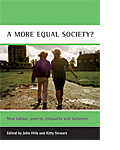
A more equal society:
New Labour, poverty, inequality
and exclusion
Edited by John Hills and Kitty Stewart, By Paul Henderson, January 2005, 408 pages. Hardback (ISBN 9781861345783), Paperback (ISBN 9781861345776), Hardback £52.00, Paperback £15.99. Published by The Policy Press Series: CASE Studies on Poverty, Palce and Policy.
Free PDF version available at www.jrf.org.uk
"A comprehensive and authoritative analysis of what New Labour's welfare reforms have achieved to date"
— Alan Deacon, School of Sociology and Social Policy, University of Leeds
"... the LSE's mighty judgement on inequality: John Hills and Kitty Stewart's A more equal society? is the definitive text."
— Polly Toynbee, The Guardian
Synopsis: This major new book provides, for the first time, a detailed evaluation of policies on poverty and social exclusion since 1997, and their effects. Bringing together leading experts in the field, it considers the challenges the government has faced, the policies chosen and the targets set in order to assess results.
Full Description: This major new book provides, for the first time, a detailed evaluation of policies on poverty and social exclusion since 1997, and their effects. Bringing together leading experts in the field, it considers the challenges the government has faced, the policies chosen and the targets set in order to assess results. Drawing on research from the Centre for Analysis of Social Exclusion, and on external evaluations, the book:
- asks how children, older people, poor neighbourhoods, ethnic minorities and other vulnerable groups have fared under New Labour;
- seeks to assess the government both on its own terms - in meeting its own targets - and according to alternative views of social exclusion.
CASE Studies on Poverty, Place and Policy series. Series Editor: John Hills, Director of CASE at the London School of Economics and Political Science. Drawing on the findings of the ESRC Centre for Analysis of Social Exclusion's extensive research programme into communities, poverty and family life in Britain, this fascinating series: Provides a rich and detailed analysis of anti-poverty policy in action; focuses on the individual and social factors that promote regeneration, recovery and renewal. For other titles in this series, please follow the series link from the main catalogue page.
John Hills is Director of the ESRC Research Centre for Analysis of Social Exclusion (CASE) and Professor of Social Policy at the London School of Economics. Kitty Stewart is Research Fellow at CASE. She is the author, with John Micklewright, of The Welfare of Europe's Children, also published by The Policy Press.
Contents: Introduction ~ Kitty Stewart and John Hills; Part One: Aspects of exclusion; Employment: tackling poverty through 'work for those who can' ~ Abigail McKnight; Education, education, education ...: an assessment of Labour's success in tackling education inequalities ~ Abigail McKnight, Howard Glennerster and Ruth Lupton; Tackling health inequalities ~ Franco Sassi; Social and political participation and inclusion ~ Liz Richardson; Part Two: Groups at risk; Disadvantaged by where you live? New Labour and neighbourhood renewal ~ Ruth Lupton and Anne Power; Towards an equal start? Addressing childhood poverty and deprivation ~ Kitty Stewart; A secure retirement for all? Older people and New Labour ~ Maria Evandrou and Jane Falkingham; Ethnic inequalities under New Labour: progress or entrenchment? ~ Coretta Phillips; Selective inclusion: asylum seekers and other marginalised groups ~ Tania Burchardt; Part Three: Overall impact; Inequality and poverty under New Labour ~ Tom Sefton and Holly Sutherland; That's the way the money goes: expenditure patterns as real incomes rise for the poorest families with children ~ Paul Gregg, Jane Waldfogel and Elizabeth Washbrook; Bringing up families in poor neighbourhoods under New Labour ~ Anne Power and Helen Willmot; Changes in poverty and inequality in the UK in international context ~ Kitty Stewart; Part Four: Conclusion: a tide turned but mountains yet to climb? ~ John Hills and Kitty Stewart.

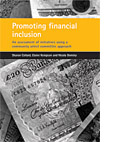
Promoting financial inclusion:
An assessment of initiatives using a community
select committee approach
By Sharon Collard, Elaine Kempson and Nicola Dominy, October 2003, 48 pages. Paperback (ISBN 9781861345509), £11.96. Published by The Policy Press.
Synopsis: This report demonstrates how community select committees can be used to give people who are directly affected by financial exclusion the opportunity to assess the initiatives designed to meet their needs. It also provides detailed practical guidance for practitioners and researchers who may want to use this approach to consult local communities.
Full Description: There is growing interest in finding ways of overcoming financial exclusion, with new and proposed initiatives from central government, not-for-profit organisations and the private sector. However, little consultation has been carried out with the people for whom these initiatives are intended.
This report demonstrates how community select committees can be used to give people who are directly affected by financial exclusion the opportunity to assess the initiatives designed to meet their needs. In particular, the report:
- explores the needs of people who are financially excluded in relation to money management, financial information and advice, and savings and assets;
- examines how far current and proposed initiatives in these areas of financial services provision meet their needs; and
- provides detailed information about running community select committees.
This report will be of interest to all those involved in promoting financial inclusion or in community consultation, including commercial and not-for-profit financial services providers, academics, and policy makers at both local and national levels.
Sharon Collard, Elaine Kempson and Nicola Dominy are based at the Personal Finance Research Centre, University of Bristol. The Centre undertakes wide-ranging research on developments in all areas of personal finance.
Contents: Introduction; Money management and financial information and advice; Savings and assets; Format for community select committees; In conclusion.

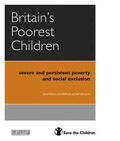
Britain’s poorest children:
Severe and persistent poverty and social exclusion
Commissioned by Save the Children and carried out by the Centre for Research in Social Policy, Loughborough University, 2nd September 2003, 170 pages. (ISBN 1 84187 081 1), £12.95.
Synopsis: Although there is a great deal of information about child poverty in Britain, very little is known about the extent of severe child poverty or about the children who are affected. As a result, it is not known whether different policy measures are required to move these children out of poverty.
Britain's Poorest Children is the first study conducted in Britain on severe and persistent child poverty and social exclusion. Drawing on the Poverty and Social Exclusion Survey of Britain, the first part of this report looks beyond one-dimensional income-based definitions of poverty, to take into account material deprivation experienced by poor children and their parents. It also examines the relationship between severe child poverty and various dimensions of social exclusion experienced by children and parents (eg, social activities, local services, education, housing, neighbourhood, financial services, well-being).
The second part of the report uses data from the British Household Panel Survey to track children's experiences of poverty over a number of years, in particular to analyse the persistence of severe poverty for children. Part 3 pulls together the findings, outlines the main policy implications and seeks to provide some answers to the question, 'Where next for research and policy for Britain's Poorest Children?'

Tackling financial exclusion:
An area-based approach
Sharon Collard, Elaine Kempson and Claire Whyley, June 2001, 64pp. Paperback (ISBN 1 86134 325 6) £12.95/US$23.50. Published by The Policy Press in association with the Joseph Rowntree Foundation.
Free PDF version available at www.jrf.org.uk
"...the most authoritative account of the evolution of the indicators, their potential for analysis and the areas in which they could be strengthened."
— 'The renewed Lisbon Strategy and social exclusion policy', Industrial Relations Journal
Synopsis: There has been mounting concern recently about people who have limited access to financial services and are considered to be financially excluded. This report identifies and examines a range of potential solutions to meet the needs of people living on the margins of financial services. Moreover, it provides practical guidance for other local communities wanting to evolve plans for tackling financial exclusion. Unlike much of the previous research on financial exclusion, this report approaches the problem from the standpoint of people who are affected by financial exclusion themselves, and live in a community where many of their friends and neighbours are also excluded.
In particular, the report i) examines the difficulties and unmet needs for financial services expressed by local people in Barton Hill, Bristol - one of the 17 Pathfinder areas in the government's New Deal for Communities initiative ii) documents a range of possible solutions to the needs of those suffering financial exclusion and iii) presents local people's assessments of the best ways to tackle the problems of financial exclusion in their own community.
This report will be of interest to all those involved in community regeneration or access to financial services, including financial service providers, local authorities, voluntary sector organisations, academics and policy makers at both local and national levels.
Contents: Introduction; About the research; Personal banking services; Saving and borrowing; Financial information and education; The needs of micro-businesses; Moving forward.


The Roma of Central and Eastern Europe
Editor: Will Guy, September 2001, 448pp. Hardback ISBN (1 902806 17 4) £40. Paperback (ISBN 1 902806 07 7) £18.99. Published by University of Hertfordshire Press.
Free PDF version available at www.jrf.org.uk
"...the most authoritative account of the evolution of the indicators, their potential for analysis and the areas in which they could be strengthened."
— 'The renewed Lisbon Strategy and social exclusion policy', Industrial Relations Journal
Synopsis: The Roma (or Gypsies) of Central and Eastern Europe have recently emerged from virtual obscurity into the glare of the international media as large numbers sought asylum in the West. This important new study challenges popular misconceptions, analysing how and why Roma have become victims of political and economic restructuring following the overthrow of Communist rule. It explains the background to mass unemployment, increasing segregation, widespread racist attacks and attempts at ethnic cleansing, showing how these new developments have reinforced their historic pariah status. At the same time it charts Roma political mobilisation and growing resistance to oppression. The book also examines the difficulties of conceptualising Roma, a multicultural diaspora with overlapping identities for which full nationhood is now claimed.
Contributors: Thomas Acton, Marian-Viorel Anastasoaie, Mít'a Castle-Kanerová, László Fosztó, Nicolae Gheorghe, Will Guy, Ian Hancock, Valdemar Kalinin, Kristina Kalinina, Donald Kenrick, Ilona Klímová, Tracy Koci, Martin Kovats, Alaina Lemon, Elena Marushiakova and Vesselin Popov, Lech Mróz, Michael Stewart, Susan Tebbutt, Nidhi Trehan.

Bridges into work?
An evaluation of LETS
Colin C. Williams, Roger Lee, Andrew Leyshon, Nigel Thrift, Jane Tooke, Theresa Aldridge, September 2001, 80pp. Paperback (ISBN 1 86134 329 9) £14.99/US$26.99.
Synopsis: Policy makers have recently displayed considerable interest in Local Exchange and Trading Schemes (LETS) as potential bridges into work for the unemployed. This report provides the first comprehensive evaluation of the effectiveness of these schemes. To enable evidence-based policy making, this report evaluates whether LETS are effective as bridges into employment and self-employment, and also whether they are effective at building reciprocal exchange networks. Bridges into work is i) the first comprehensive evaluation of LETS ii) feeds into evidence-based policy making by identifying the ways in which. LETS build bridges into work for the unemployed iii) advocates the recognition and valuing of work beyond 'employment' and iv) identifies the barriers to participation in LETS and how these can be overcome.
Contents: Part I. Building bridges into work: The third way approach; The role of the third sector in the third way; Beyond bridges into employment: strengthening the 'community economy'; Part II. The anatomy of a third sector initiative: Local Exchange and Trading Schemes (LETS); Examining LETS; The origins and growth of LETS; Who joins and why?; Part III. Evaluating LETS as bridges into work: LETS as bridges into employment; LETS as seedbeds of self-employment; LETS as vehicles for mutual aid; Barriers to participation in LETS; Part IV. Harnessing LETS: Changes required in the internal operating environment; Changes required in the external operating environment; Conclusions.

Inequalities in life and death:
What if Britain were more equal?
Richard Mitchell, Daniel Dorling and Mary Shaw, September 2000, 68pp. Paperback (ISBN 1 86134 234 9) £13.95/US$25.00. Published by The Policy Press in association with the Joseph Rowntree Foundation.
Free PDF version available at www.jrf.org.uk
"This report offers a unique and revealing look into Britain's future. It predicts where and how many lives might be saved if Britain achieves full employment, eradicates child poverty and continues the mild income redistribution shared by Gordon Brown. It should be read by all those interested in tackling health inequalities in Britain."
— Heather Joshi, Centre for Longitudinal Studies, Institute of Education
Synopsis: This follow up report to Death in Britain (Joseph Rowntree Foundation, 1997) - a study of changes in death inequalities from the 1950s to the 1990s - contains further evidence of the widening geographical gap in mortality in Britain, but shows how this gap might be narrowed through social and economic policies. The Death in Britain report claimed that Britain was failing to reach Target One of the World Health Organisation - to reduce inequalities in health by 2000. Inequalities in life and death provides conclusive evidence that Britain has failed to reach that target and argues that this failure need not continue.
The report presents research which shows what the effect on mortality would be, in terms of actual numbers of lives saved, if full employment were achieved, child poverty eradicated and material inequalities reduced. The geographical analyses are primarily based on parliamentary constituencies. Inequalities in life and death:
- illustrates and explains Britain's changing geographical pattern of mortality
- explains the role played by age, gender, social class and employment status in producing geographical inequalities in mortality
- explains the impact of changes in social injustice throughout the 1980s and 1990s
- demonstrates the potential impact of current policy in tackling health inequalities.
The evidence is clearly portrayed with extensive use of full-colour maps and graphs. This report is essential reading for policy makers, academics and all those interested in reducing inequalities, particularly with respect to health policy.
Contents: Introduction; Policy implications; How much of the change can be accounted for?; Principles and variables; How British society is changing; Methods and measurements; Conclusion.

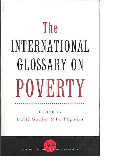
The International Glossary on Poverty
Edited by David Gordon and Paul Spicker, February 1999, 176pp. Paperback (1 85649 688 0) £12.95 / $17.50. Published by Zed Books.
Synopsis: This unique international glossary provides an authoritative guide to some 200 technical terms used in contemporary scholarly research on poverty. Each entry contains definitions and explanations, followed by a select reading list of relevant journal articles and books. The Glossary has been compiled by academics from a number of countries and international agencies with the intention of sensitising scholars, students and policymakers working in a variety of disciplines to the complexities of the issues relating to the subject. In particular, the Glossary will help overcome the current difficulties arising from the absence of an agreed vocabulary, as well as the unfamiliarity of terms and concepts in one relevant discipline to those operating in others. The multidimensional character of poverty becomes visible and a special effort has been made to include non-Western approaches and concepts with a view to facilitating comparative poverty studies. A second edition has now been published.

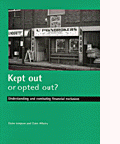
Kept out or opted out?
Understanding and combating financial exclusion
Elaine Kempson and Clare Whyley March 1999, 60pp. Paperback (ISBN 1 86134 159 8) £12.95/US$23.50. Published by The Policy Press in association with the Joseph Rowntree Foundation.
Synopsis: Despite widespread interest in financial exclusion, remarkably little is known about the extent and nature of the problem. This report fills that gap. Using data from the Family Resources Survey it identifies how many households in Britain have no, or very few, mainstream financial products and who they are. It also draws on 87 in-depth interviews to describe the processes that lead to financial exclusion and the consequences for households that are excluded financially. Finally, it documents the unmet needs that exist for financial products; the mismatch between those needs and current provision; and identifies innovative ways of providing financial services that are more appropriate to the needs of financially excluded households. The report will be valuable to policy-makers, debt counsellors and financial advisors as well as students and academics in the field of social policy.
Contents: Introduction; The extent of financial exclusion; The processes offinancial exclusion; Unmet needs and the consequences of financial exclusion; Meeting the needs of financially excluded households; Summary and policy implications.

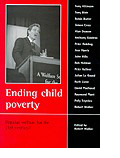
Ending child poverty:
Popular welfare for the 21st century?
Edited by Robert Walker, Centre for Research in Social Policy, Loughborough University.
Free PDF version available at www.jrf.org.uk
"Rather than listing once again the facts about child poverty, this book gives a unique insight into how the Prime Minister and the leading policy commentators and analysts think about policy issues. Since values and assumptions set the boundaries to political debate, it is essential reading for anyone who wishes to understand the strengths and weaknesses of our policies to tackle child poverty."
— Peter Taylor-Gooby, Professor of Social Policy, University of Kent
Synopsis: In the Beveridge Lecture, delivered on 18 March 1999, Prime Minister Tony Blair committed his government to abolishing child poverty within 20 years. He concluded that the present-day welfare state is not fitted to the modern world, and laid out his vision for a welfare state for the 21st century. Blair's vision, grounded in a particular conception of social justice, is perhaps as challenging as the blueprint laid down by Beveridge. Ending child poverty presents Blair's Beveridge Lecture alongside the views of some of Britain's foremost policy analysts and commentators. This unique collection makes it possible not only to read the ideas of leading current thinkers in this critical area of policy, but also to compare them with the Prime Minister's Lecture, and to see which ideas he himself took up and in what form. Ending child poverty is a record not only of the Lecture itself, but also of the ideas available to government and their influence on its leader at an important moments in the formation of policy. It provides a rich tapestry of analysis, insight and reflection that will, it is to be hoped, stimulate critical debate about the future shape of British welfare.
Contents: Forward: Lord Butler; Section 1: Welfare for the 21st century; Introduction Robert Walker; Beveridge revisited: a welfare state for the 21 century Tony Blair; Section 2: Contributions; Beveridge and his legacy; Beveridge and the Beveridge report - life, ideas, influence Jose Harris; Beveridge and the 21st century Tony Atkinson; Beveridge and New Labour: poverty then and now John Hills; Modern social justice; Notes on social justice and the welfare state Anthony Giddens; Social Justice Raymond Plant: Conceptions of social justice Julian Le Grand: Equality of access Peter Kellner; The balance of rights and responsibilities within welfare reform Alan Deacon; Social justice into practice; The New Right and New Labour David Piachaud; A modern party of social justice: achievements and missed opportunities Ruth Lister; Social security: a cornerstone of modern justice Robert Walker; Making welfare work Polly Toynbee; The new welfare Bob Holman; Section 3: Responses; A poor press? Media reception of the Beveridge Lecture Simon Cross and Peter Golding; Dimensions of the debate: reflections on the Beveridge Lecture Robert Walker This collection is essential reading for anyone interested in the future of modern society and politics and provides an accessible handbook for undergraduate students of politics, social policy and sociology.
→ Download Tony Blair's full speech on Child Poverty [DOC, 0.06MB]


Home Sweet Home?
The impact of poor housing on health
Alex Marsh, David Gordon, Christina Pantazis and Pauline Heslop, 29 September 1999, 104pp. Paperback (ISBN 1 86134 176 8) £16.99/US$31.00. Published by The Policy Press.
Synopsis: How much does the condition of our housing affect our health? This timely new study looks in detail at the impact poor housing has on health, using data from the National Child Development Study (NCDS). It provides important information to inform the current debate on Our Healthier Nation and to strengthen arguments for health, housing and social care agencies to work together.
This publication focuses on three main areas: if, and when, housing deprivation impacts overall health; the link between overcrowding and respiratory and infectious disease; housing deprivation in the context of other possible influences on health.
The study uses the innovative approach of creating indices for both the severity of ill-health and housing deprivation. These indices are incorporated into an analysis of the impact over time of housing deprivation upon health. The authors conclude that housing plays a significant role in health outcomes and hence provides support for the argument that addressing housing deprivation should be central to thinking about health improvement.
Home Sweet Home? The impact of poor housing on health is essential reading for researchers and students in housing, public health, urban renewal, and social policy as well as professionals working in these areas.

Homelessness: Exploring the new terrain
Edited by Tricia Kennett and Alex Marsh, September 1999, 316pp. Paperback (ISBN 1 86134 150 4) £18.99/US$34.50. Hardback (ISBN 1 86134 167 9) £45.00/US$81.00. Published by The Policy Press.
Synopsis: This important new book brings together contemporary theoretical debates and original empirical research in order to explore the nature, experience and impact of social change in the new "landscape of precariousness" in which new sets of risks and uncertainties have emerged. It adopts a multi-disciplinary approach, which is essential to develop a more subtle understanding of both the complex processes leading to and the experience of homelessness. The book will be essential reading for students and researchers in a range of subject areas including housing studies, social policy, socio-legal studies and public administration.
Contents: Exploring the new terrain Alex Marsh and Patricia Kennett; The new landscape of precariousness Ray Forrest; Theorising and contextualising homelessness in the restructuring city Patricia Kennett; Homelessness in rural areas: An invisible issue Paul Cloke, Paul Milbourne and Rebekah Widdowfield; Home is where the heart is: Engendering notions of homelessness Sophie Watson; Theorising homelessness and 'race' Malcolm Harrison; The criminalisation of homelessness, begging and street living Gary Fooks and Christina Pantazis; The homelessness legislation as a vehicle for marginalisation: Making an example out of a paedophile David Cowan and Rose Gilroy; Old and homeless: A double jeopardy Derek Hawes; Homelessness in Russia: The scope of the problem and the remedies in place Yana Beigulenko; Implementing 'joined-up thinking': Multi-agency services for single homeless people in Bristol Jenny Pannell and Siân Parry; Models of resettlement for the homeless in Europe Brian Harvey; Conclusion Patricia Kennett.

New Pensions for Old: The Key to Welfare Reform
Peter Townsend
"Unless certain changes are made, the Government’s own stated objectives are not going to be fulfilled. 'Security for all' will not materialise. The 'guarantee' will be a chimera. Inequality among pensioners will go on increasing. Poverty among pensioners, in a real sense, will grow"
— (p.1)
→ Download [PDF, 0.12MB] [DOC, 0.23MB]

Professor Peter Townsend: List of Publications, 1948-2003
This list of annotated publications was launched to celebrate the 80th birthday of Professor Peter Townsend. The Townsend Centre has been established by the University of Bristol in response to the United Nations first International Decade for the Eradication of Poverty (1997-2006), and in recognition of the work of Professor Peter Townsend.
→ Download [PDF, 360KB]

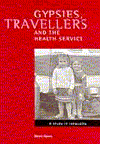
Gypsies, Travellers and the Health Service:
A study in inequality
Derek Hawes, School for Policy Studies, University of Bristol, October 1997, 56pp. Paperback (ISBN 1 86134 066 4) £10.95/US$19.95). Published by The Policy Press.
Free PDF version available at www.jrf.org.uk
"...the most authoritative account of the evolution of the indicators, their potential for analysis and the areas in which they could be strengthened."
— The renewed Lisbon Strategy and social exclusion policy, Industrial Relations Journal
Synopsis: This report considers recent research on the relative poor health of nomadic families compared with settled peoples in England and Wales. It places the issues in the context of the wider debate on inequalities in healthcare and the impact of the Criminal Justice Act on access to health services, including new work relating the cultural and environmental contexts of nomadic lifestyles and their relationship to morbidity, injury and poor understanding. The report highlights examples of current good practice, in terms of outreach services and of collaborative inter-professional works; looks at the relationship between site provision and good health; and maps out clear recommendations for the services.
Contents: Introduction: Who are the travellers?; An unhealthy community? The evidence piles up; Impact of the 1994 Criminal Justice and Public Order Act; Some innovations and some causes for concern; Conclusions and recommendations.



